Why you can trust Tom's Hardware
Ryzen 7 5800X Application Performance - The TLDR
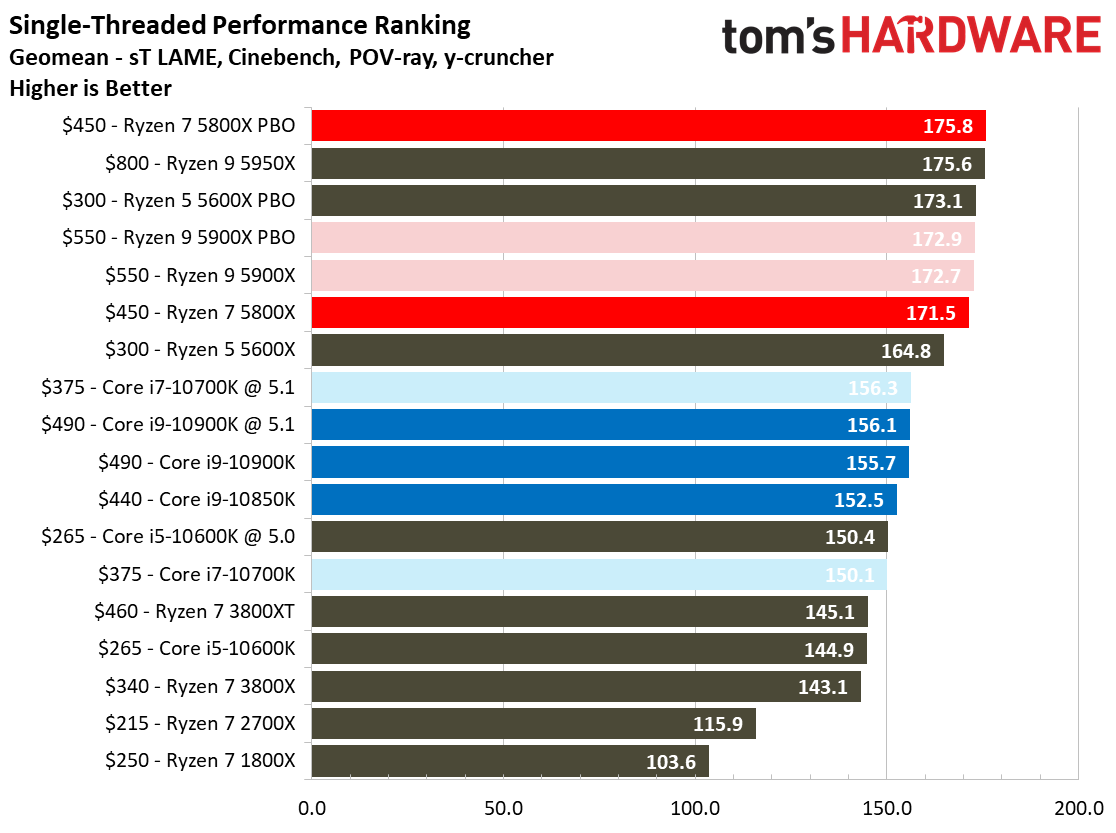
This geometric mean of both the most lightly- and heavily-threaded tests in our application suite speak volumes. We're quite accustomed to seeing AMD's chips lead in the multi-threaded rankings while trailing, sometimes by sizeable margins, in the single-threaded performance ranking. That isn't the case anymore.
Although the Ryzen 5 5600X is incredibly potent in gaming performance given its price point, if you want the fastest possible single-threaded application performance possible without dropping $800 for the Ryzen 9 5950X, the Ryzen 9 5900X and Ryzen 7 5800X are your chips. However, the 5950X nudges past the 5800X by less than 1%. On the other end of the spectrum, at stock settings, the Ryzen 7 5800X beats the Ryzen 5 5600X by 4%, which doesn't sound like much unless you consider the relatively slim deltas we're accustomed to in this ranking.
Intel's Core i7-10700K and i9-10900K aren't very impressive by comparison - in lightly-threaded work, they trail by 14% and 10%, respectively, and even overclocking the chips doesn't bring them up to par with the stock Ryzen 7 5800X. In contrast, after tuning, the Ryzen 7 5800X offers the fastest single-threaded performance of AMD's Zen 3 stable.
Threaded applications fall more into the target area of content creators, and here we see that the Ryzen 7 5800X beats the Core i7-10700K easily, but the 10700K's lower price point, not to mention AMD's $150 gap between the Ryzen 7 and 5 families, allows it to slot in as a value alternative for the productivity-minded.
In terms of threaded performance, the Ryzen 7 5800X faces the most competition from the comparably-priced Core i9-10850K. At stock settings, the 1085K leads by 3% in our cumulative threaded performance measurement, and assuming your chip overclocks as well as ours did (we use the 10900K @ 5.1 for the stand-in because the chips are identical after tuning), that could jump to a 10% improvement in threaded work.
That does complicate matters for those that prioritize threaded horsepower, but here the 10850K's comparably-lackluster single-threaded performance enters the equation. Overall, the Ryzen 7 5800X offers a better blend of performance in both single- and multi-threaded workloads given the similar price points, and that's only if you're considering the application performance side of the equation. Despite the 10850K's $10 price advantage, the 5800X's excellent gaming performance sweetens the deal.
In reality, the Ryzen 7 5800X's biggest competitor comes from within the Ryzen stack - the Ryzen 9 5900X offers far superior threaded performance, along with better performance in gaming and lightly threaded applications, but for only $100 more. That's a 22% increase in price for 37% more threaded performance. Given that impressive return, $100 isn't a bridge too far for most high-end builds, so pay attention to the 5900X in the charts below.
Get Tom's Hardware's best news and in-depth reviews, straight to your inbox.
Rendering Benchmarks on Ryzen 7 5800X
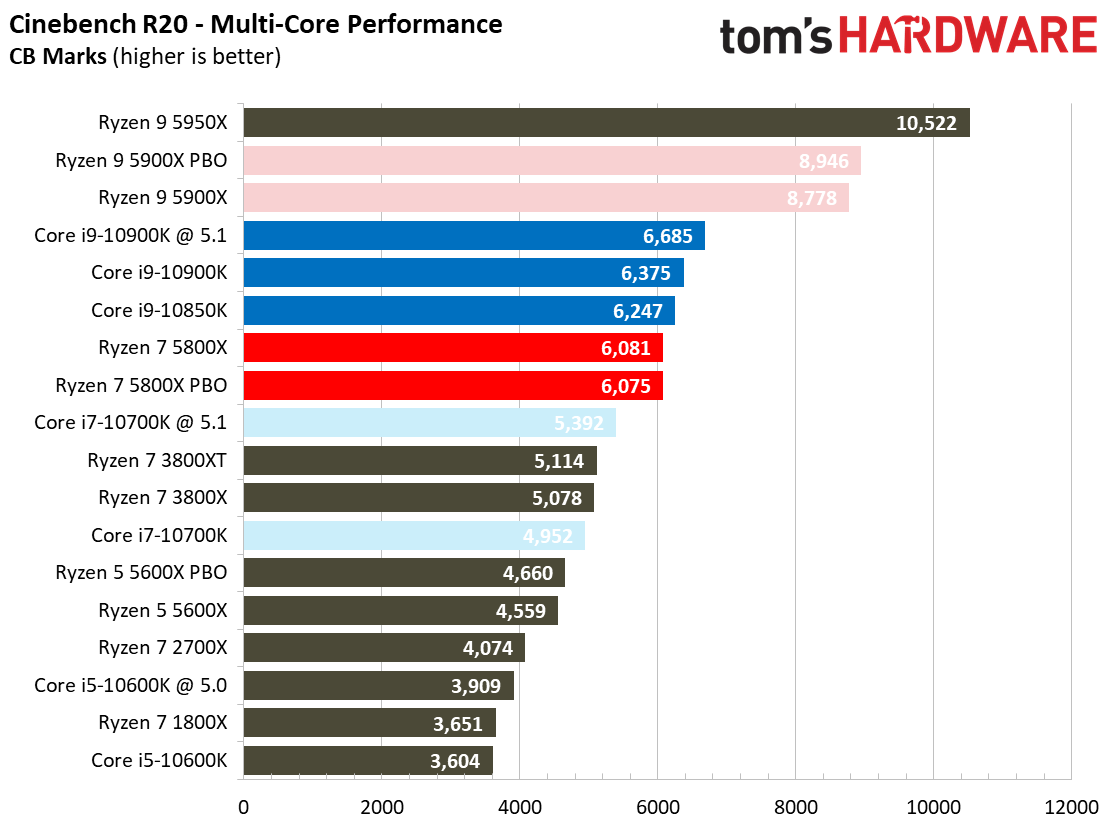
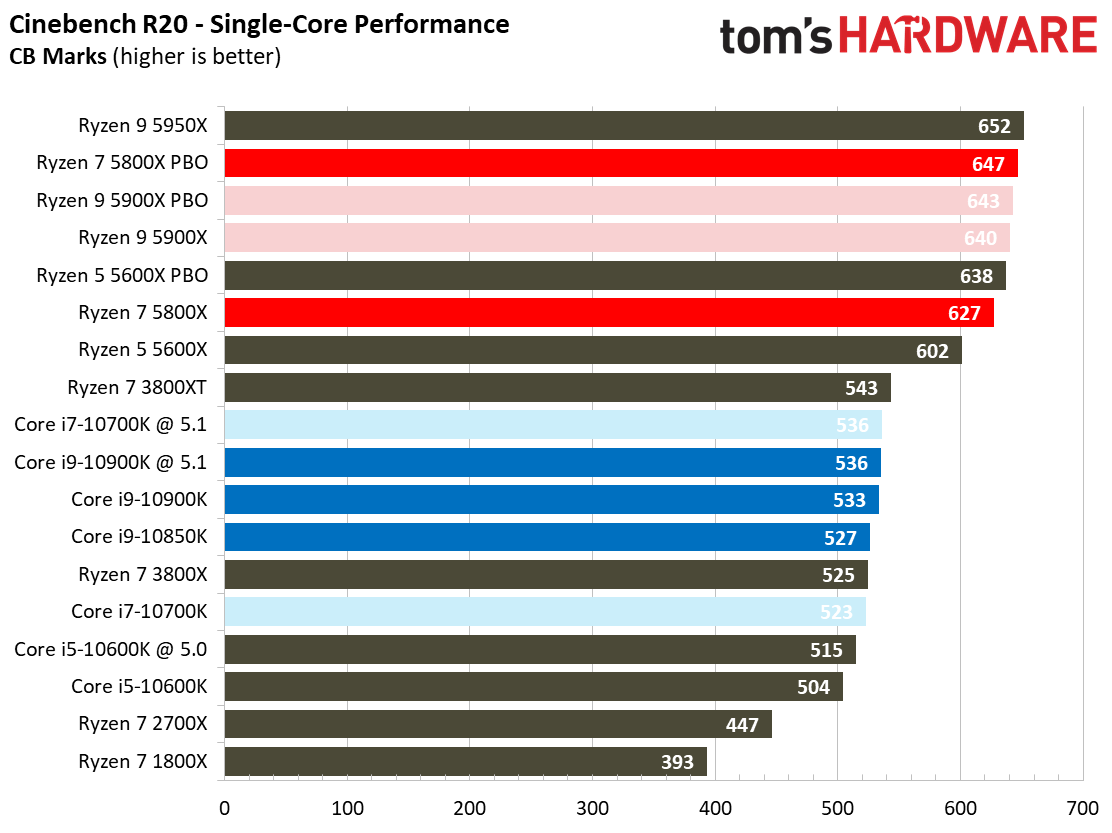
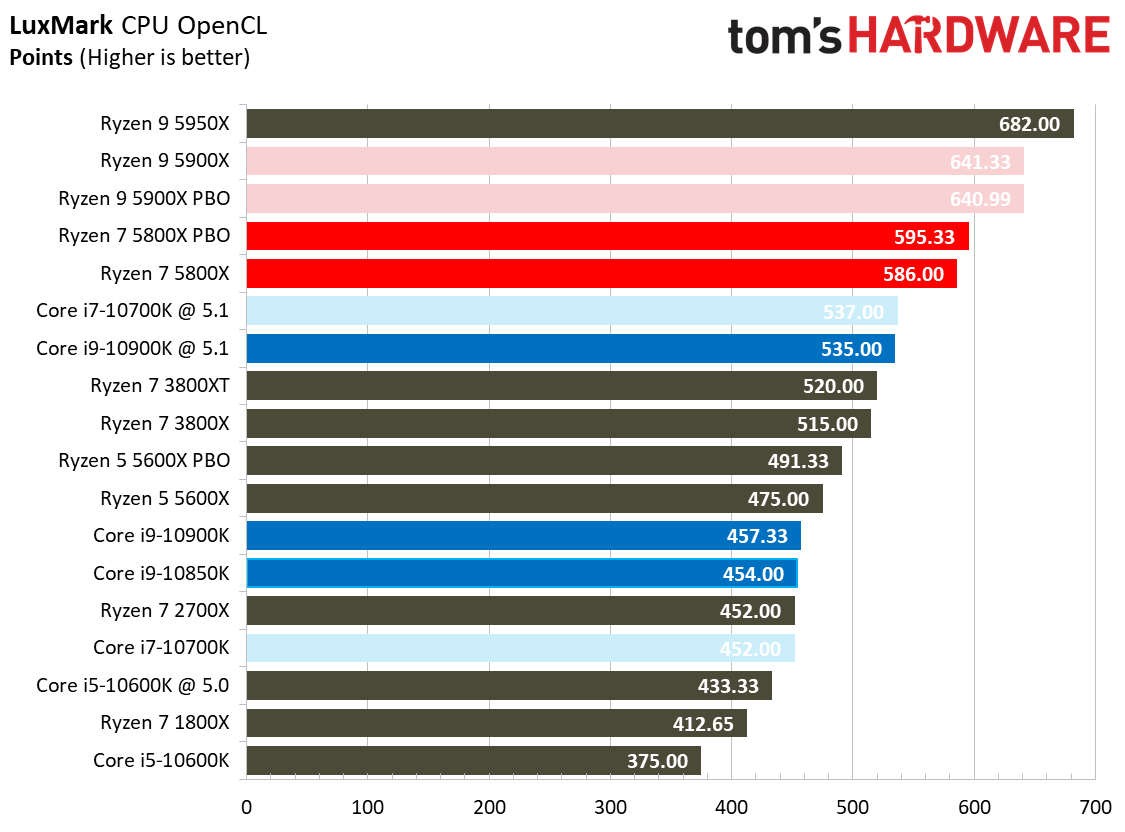
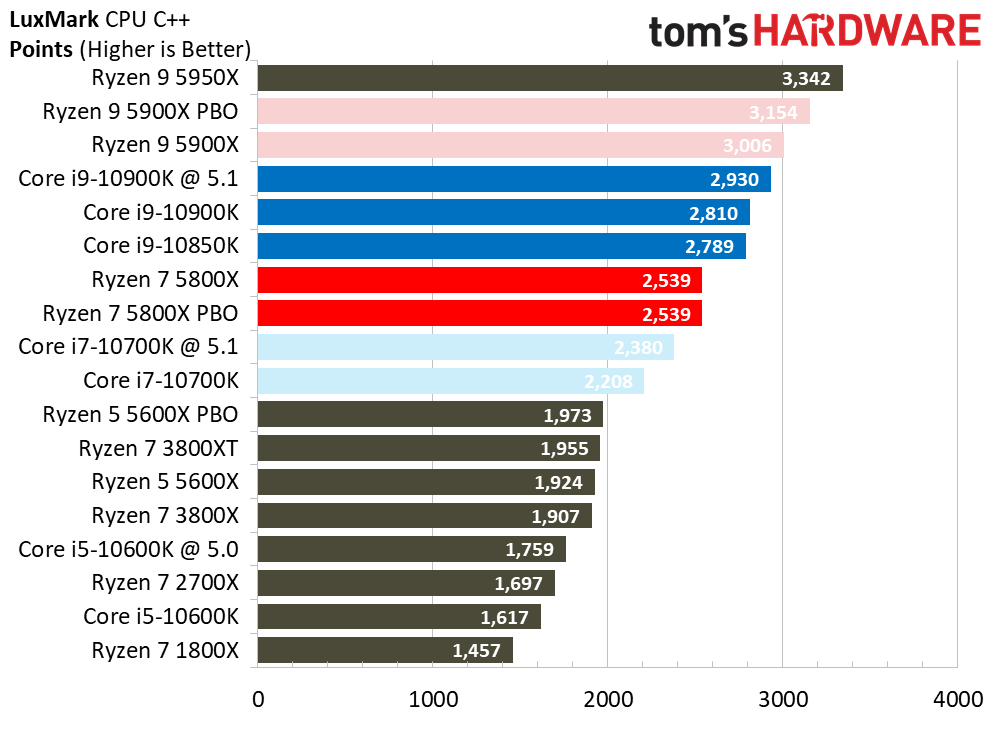
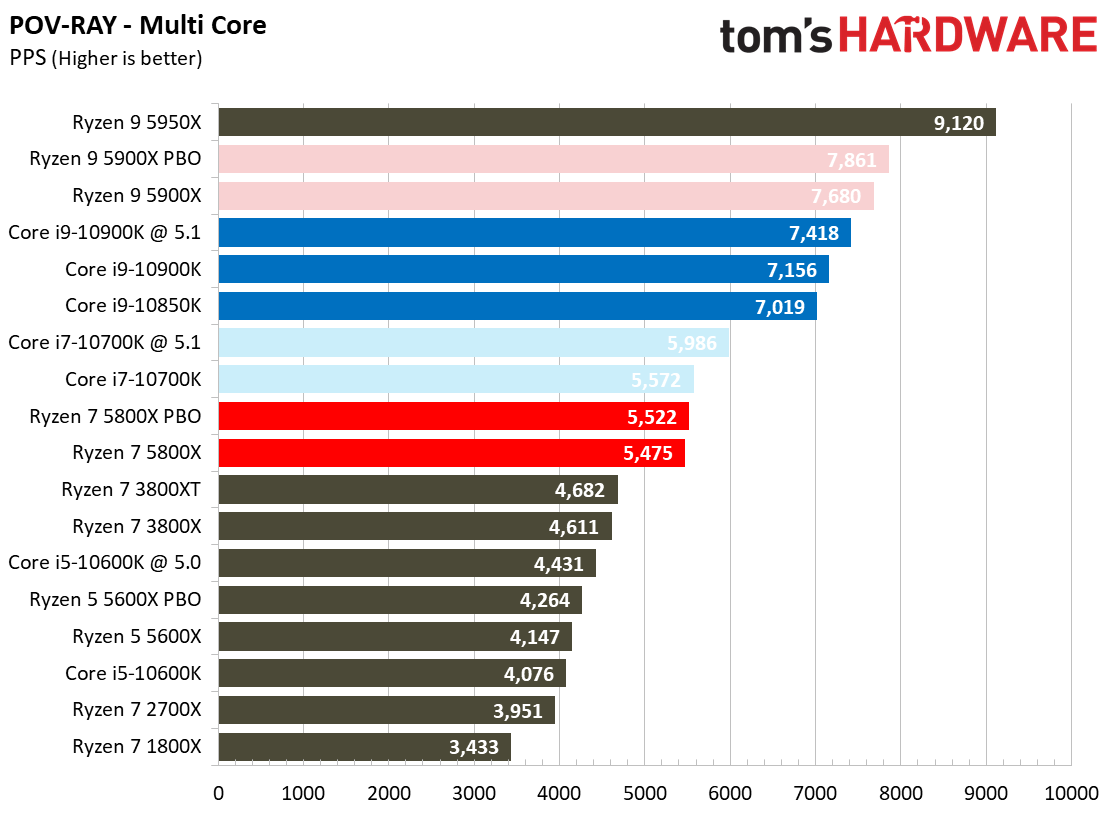
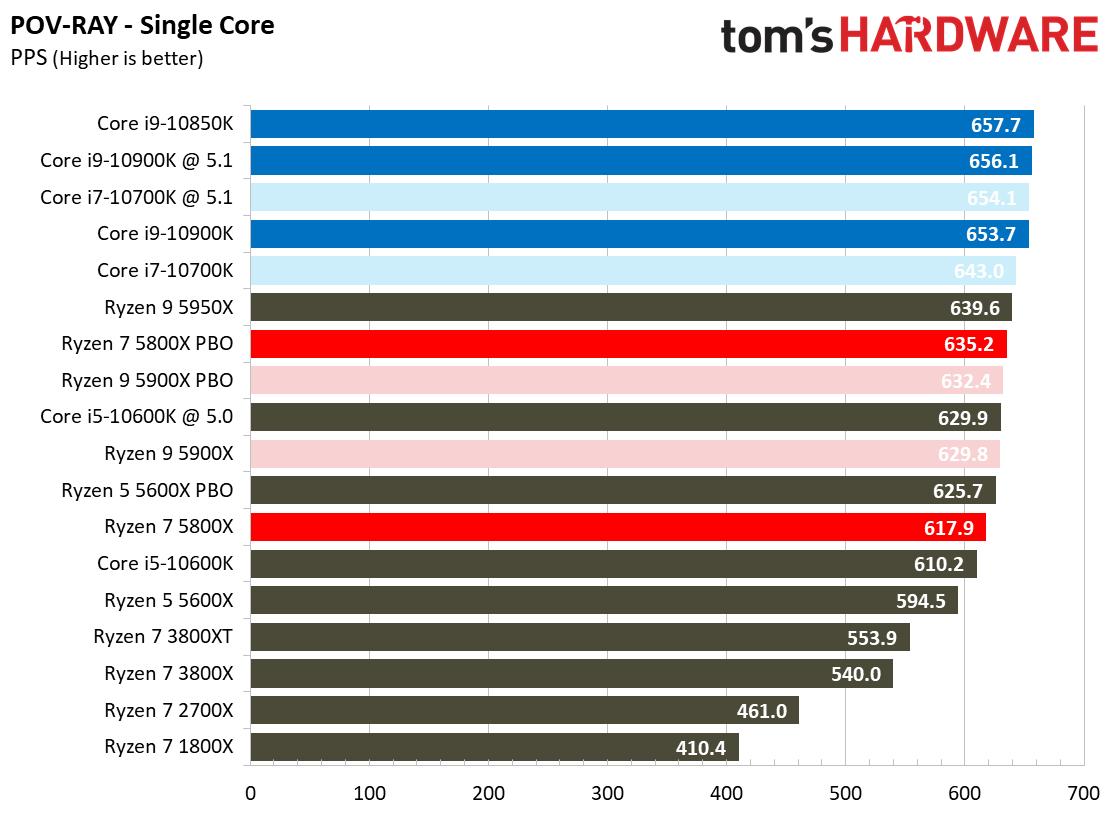
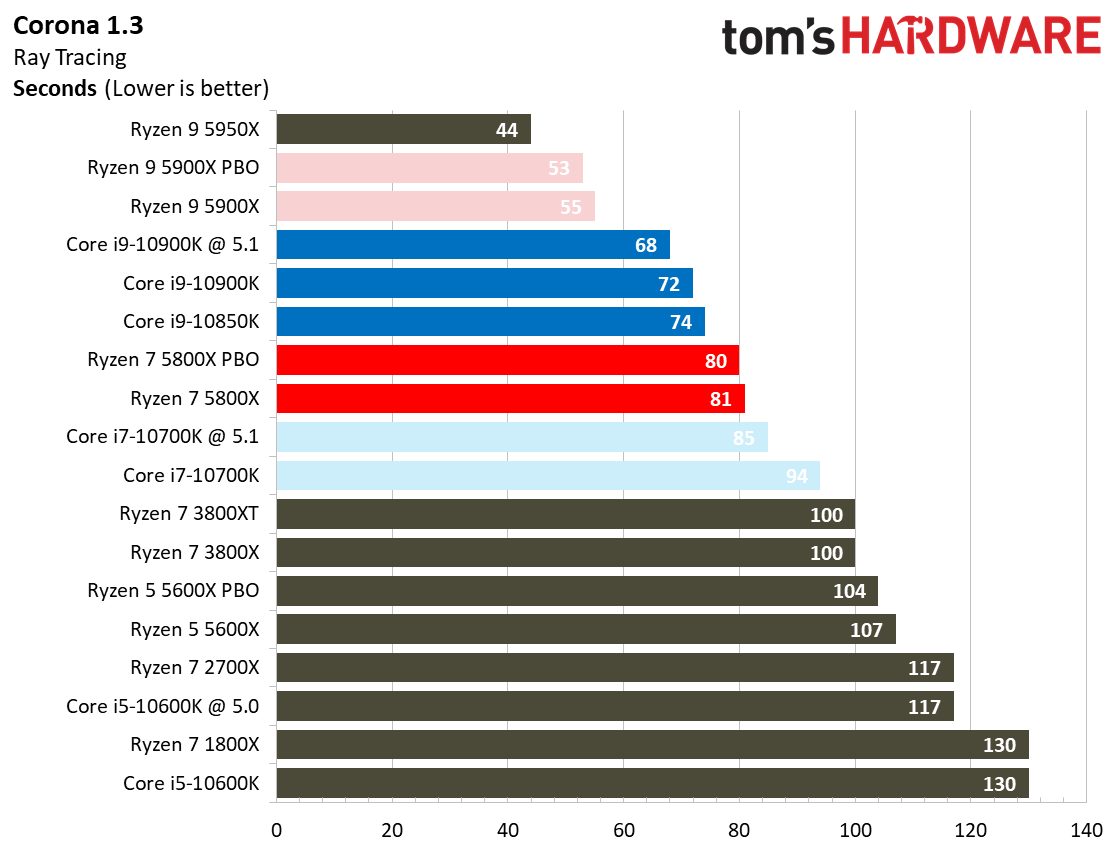
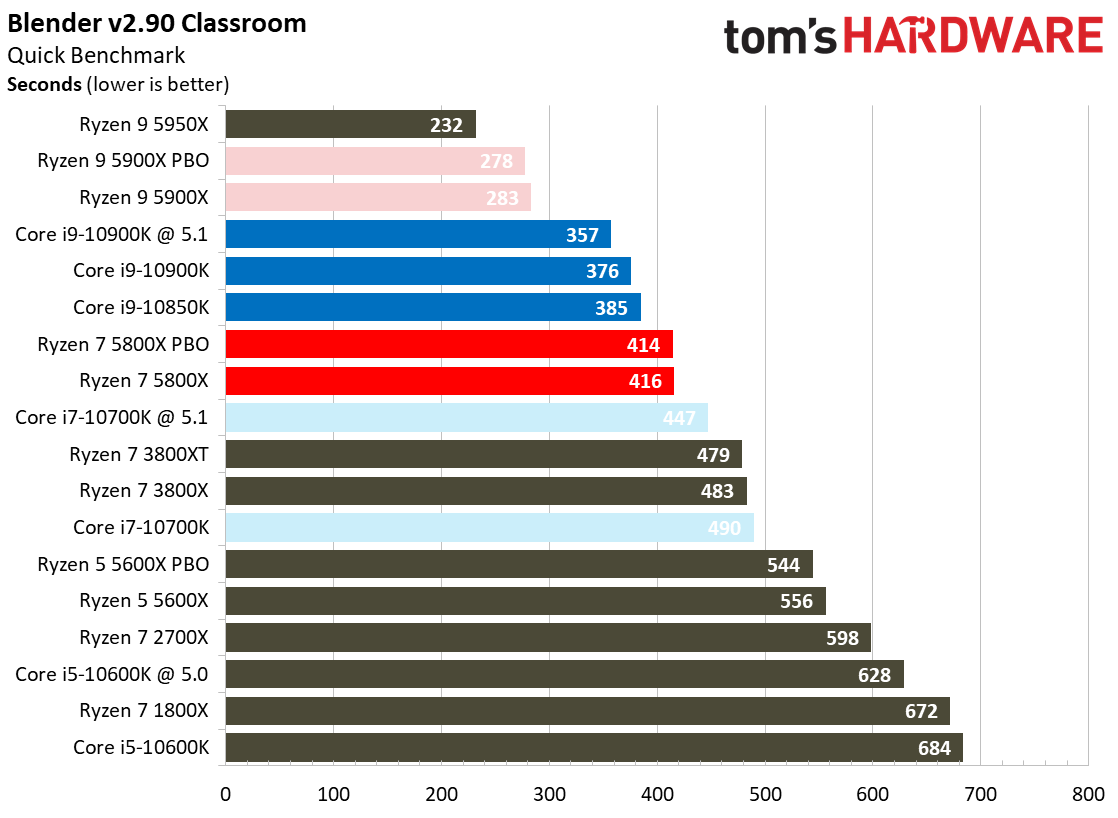
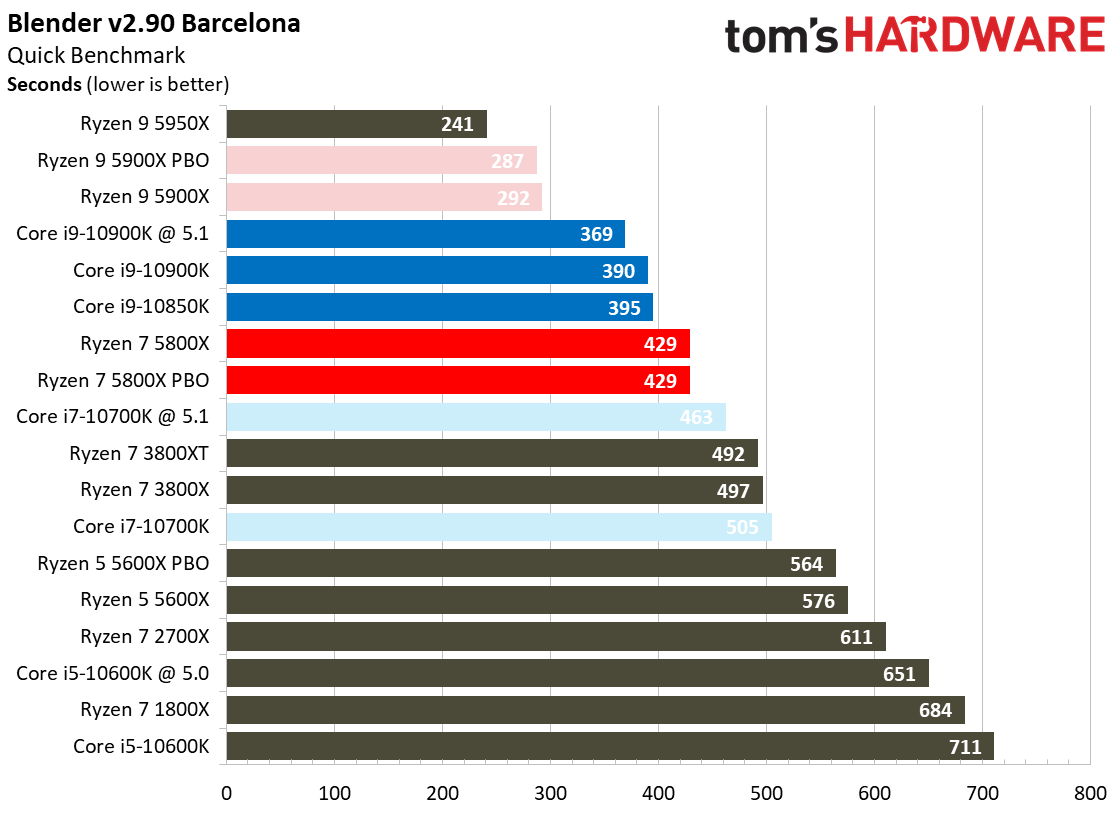
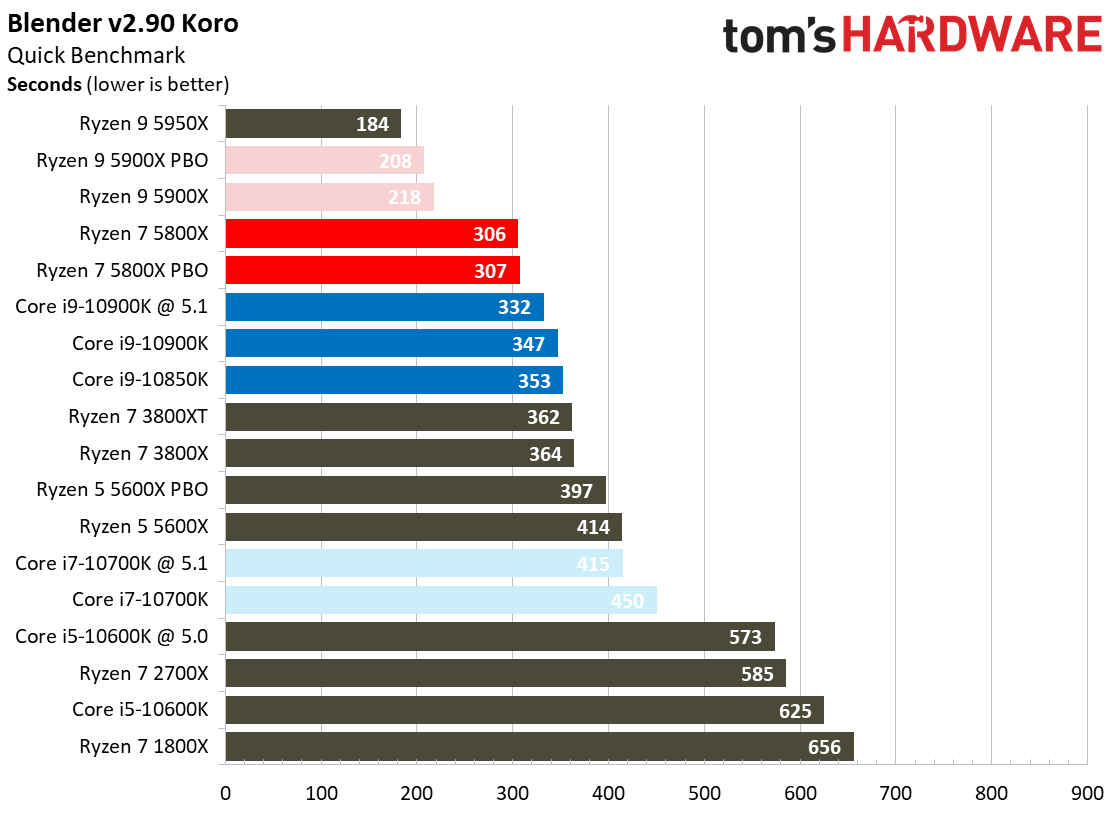
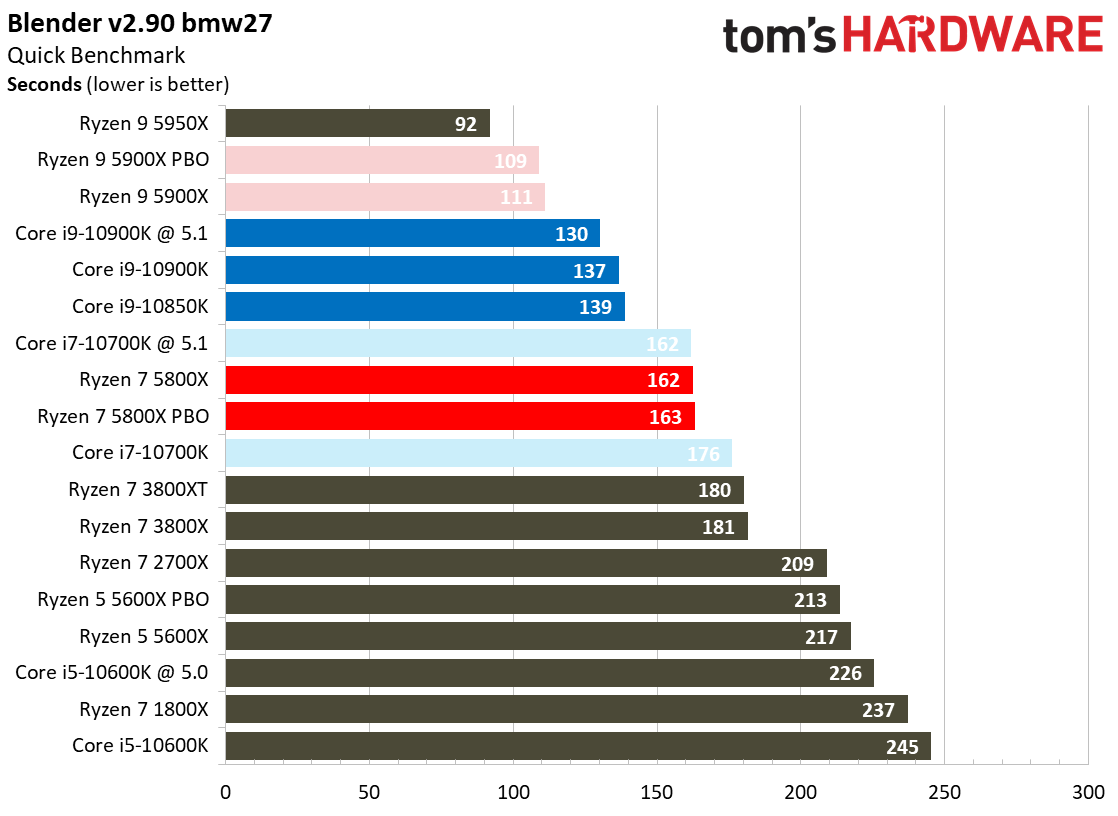
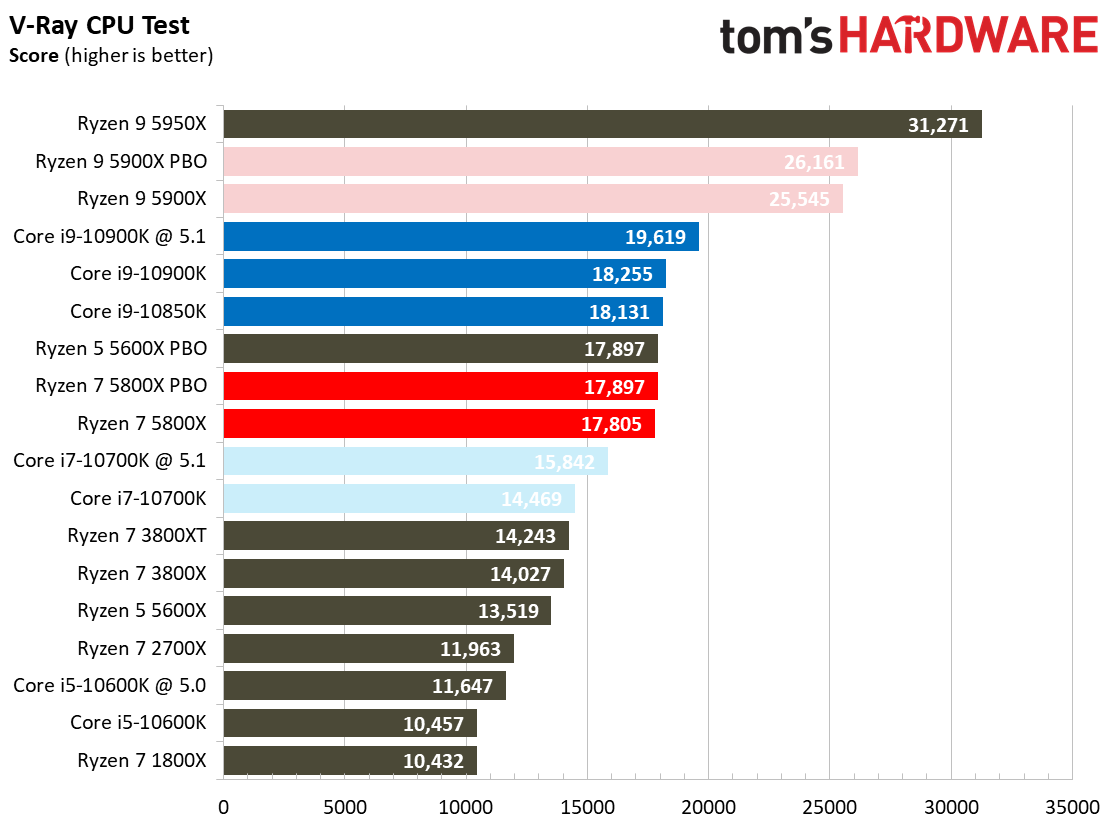
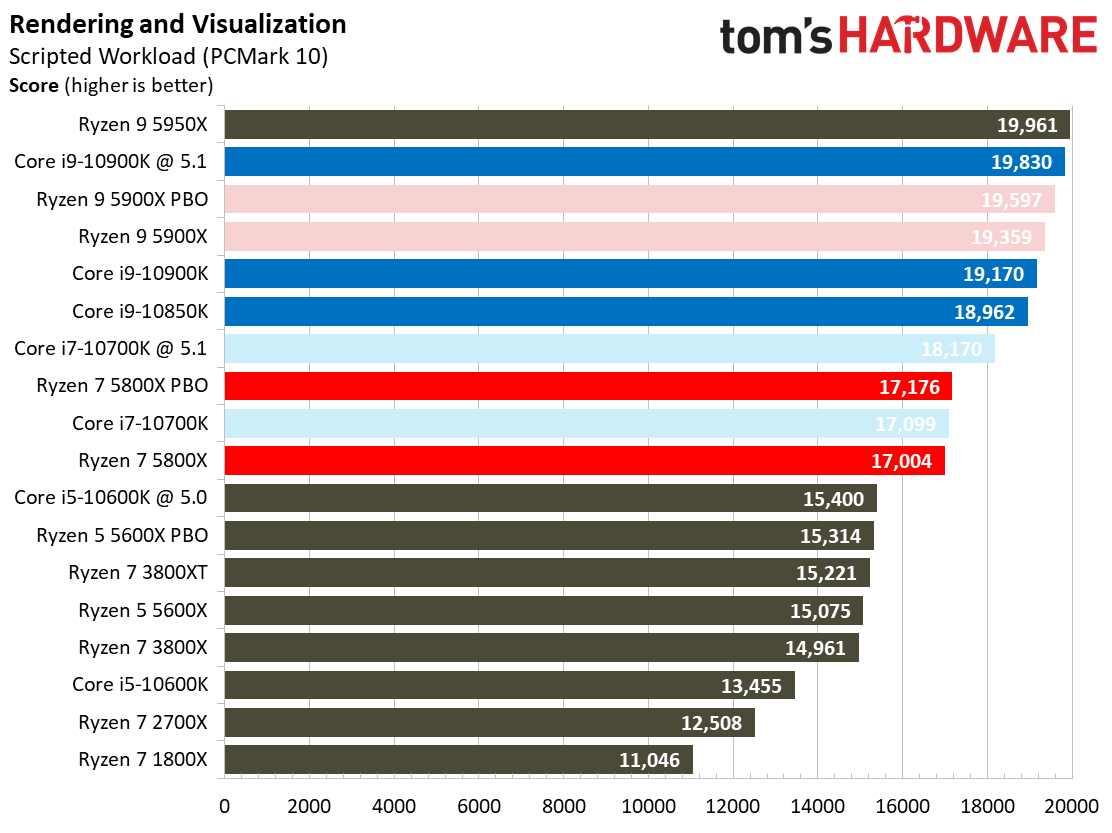
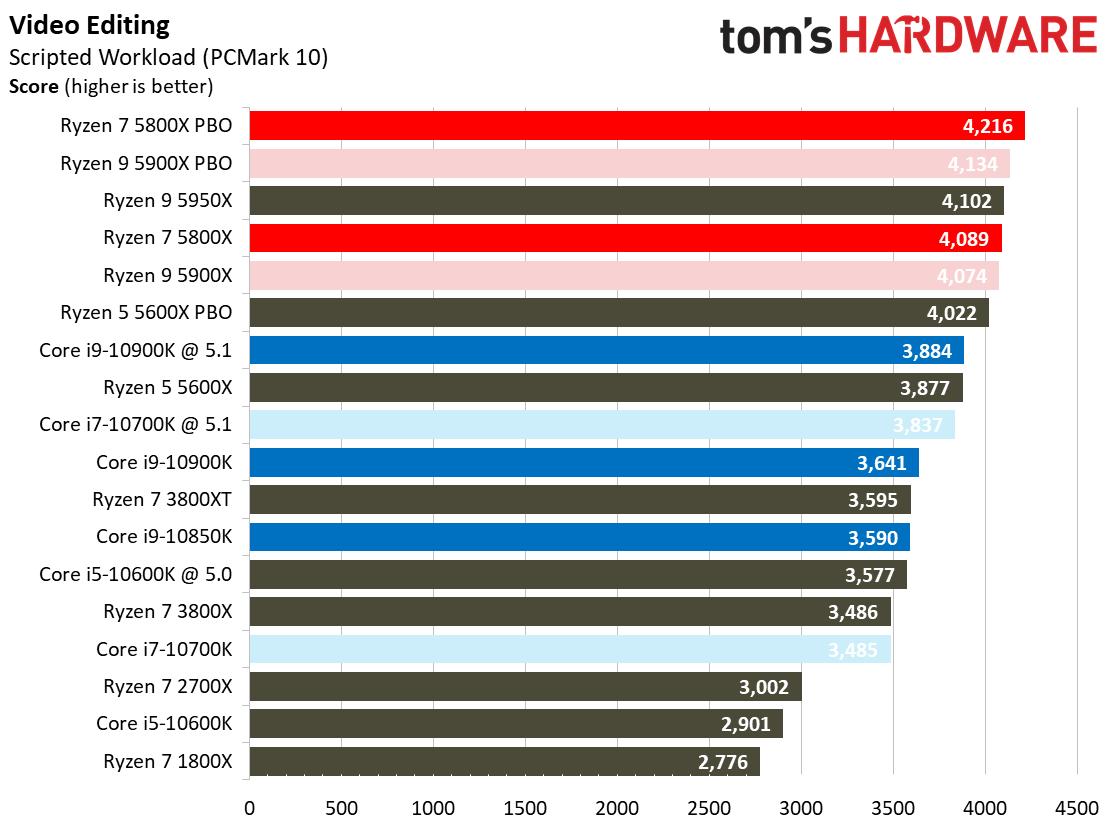
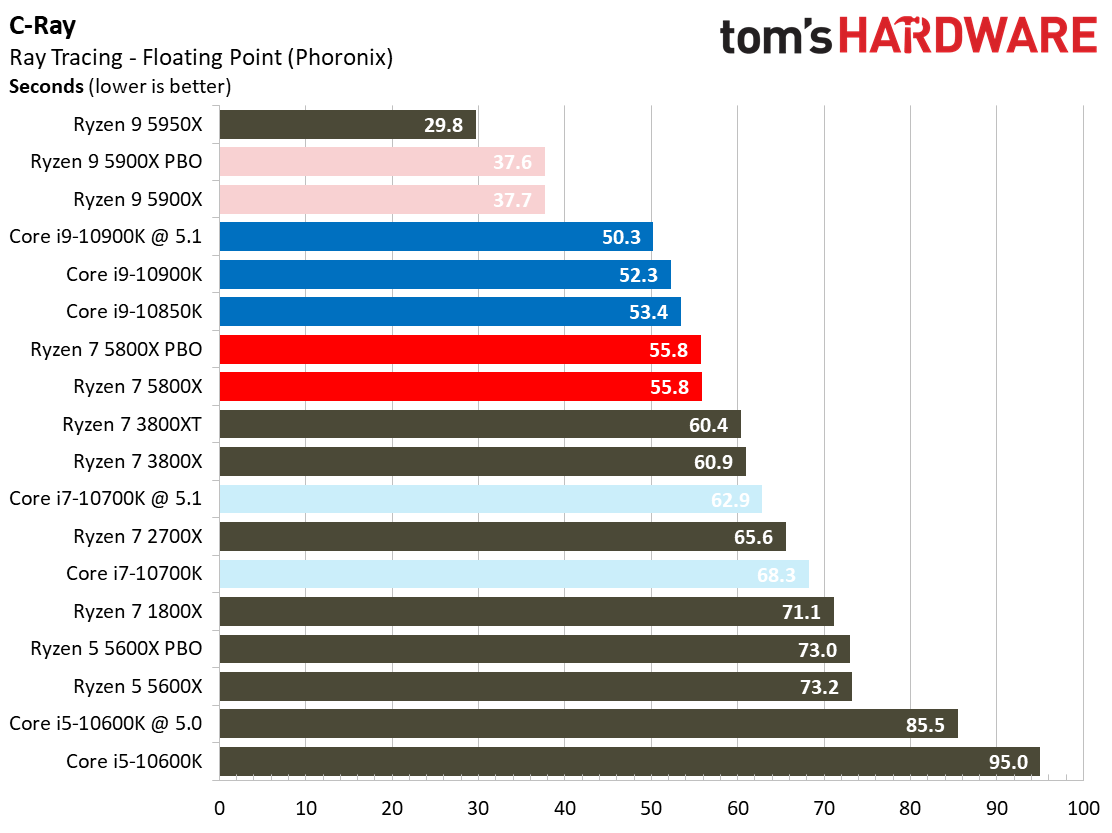
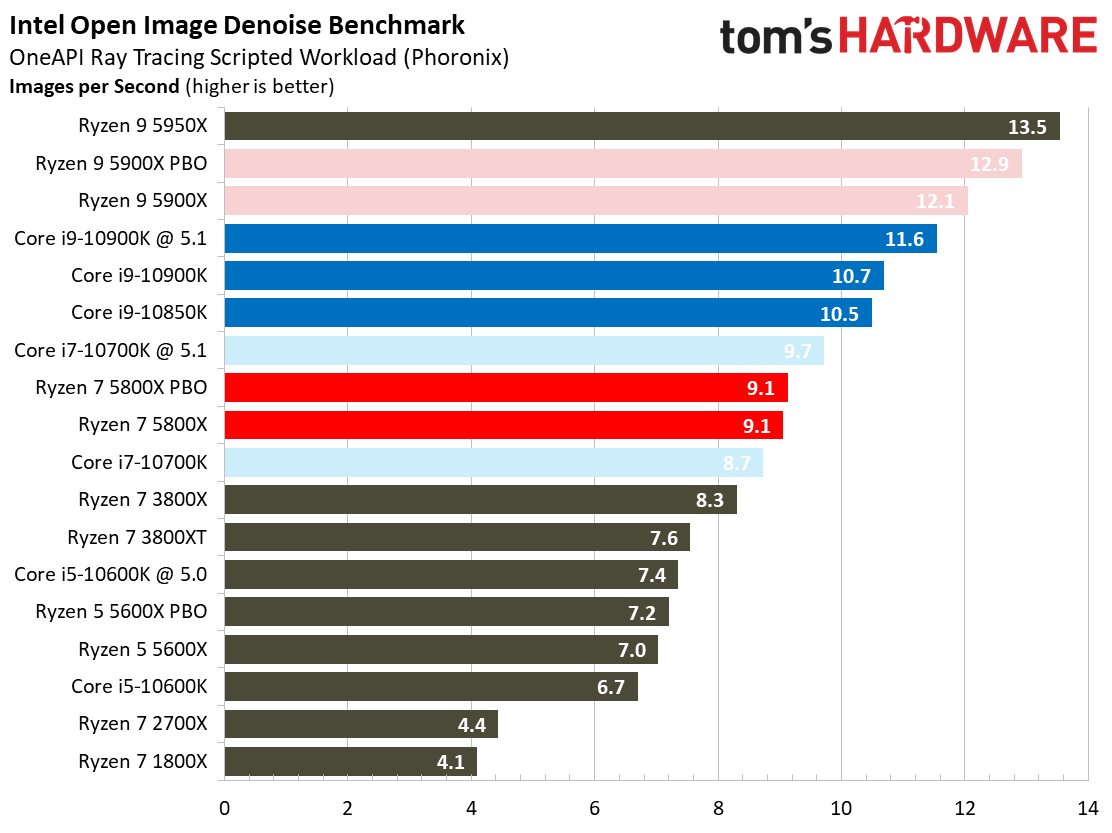
Cinebench has long been AMD's favorite benchmark for a simple reason; the Zen microarchitecture has always performed extremely well in the threaded benchmark. However, AMD has steadily improved its performance in the single-threaded benchmark and slowly worked its way up the chart.
The Ryzen 7 5800X continues to flaunt its single-threaded prowess with a big gain over the Ryzen 5 5600X in the single-threaded Cinebench benchmarks, placing it far ahead of Intel's competing chips - even after they've been heavily overclocked. The Core i9-10900K and 10850K leverage their extra two cores and four threads to take the lead in the threaded Cinebench test, but by surprisingly thin margins given their core counts. For instance, the 10900K leads by 5% at stock settings but has 25% more cores. Overclocking widens the delta, though, giving the 10900K a 10% lead over the 5800X.
Intel's per-core strength in AVX-heavy workloads comes into play during the single-threaded POV-Ray test, giving the 10900K a 6% lead, and that scales to a 30% lead for Intel in the threaded version of the benchmark. The Core i9-10850K also performs admirably here with a 27% lead over the Ryzen 7 5800X.
The LuxMark OpenCL test finds the 5800X leading the Intel comparables by an impressive margin, but those roles reverse in the C++ run. The Intel i9 processors also lead in most of our Blender renders (Koro being the exception) and the C-Ray and Corona tests. Meanwhile, the Core i7-10700K can't offer the 5800X's level of performance in these threaded tests.
We recently integrated the Intel Open Image Denoise Benchmark into our suite. This ray-tracing test uses Intel's oneAPI rendering toolkit. Hence, it provides an interesting take on performance that's more of an academic exercise than an indication of real-world performance – at least for now. OneAPI is still in the early days of development, not to mention adoption, but it is an interesting display of Intel's latest approach - but in a decidedly Intel-friendly test. Here we can see that the 5600X beats the stock Core i5-10600K at stock settings, and the Ryzen 7 5800X strides past the 10700K. However, the Core i9-10900K and i7-10700K lead over the 5800X in this admittedly Intel-favorable test.
Encoding Benchmarks on Ryzen 7 5800X
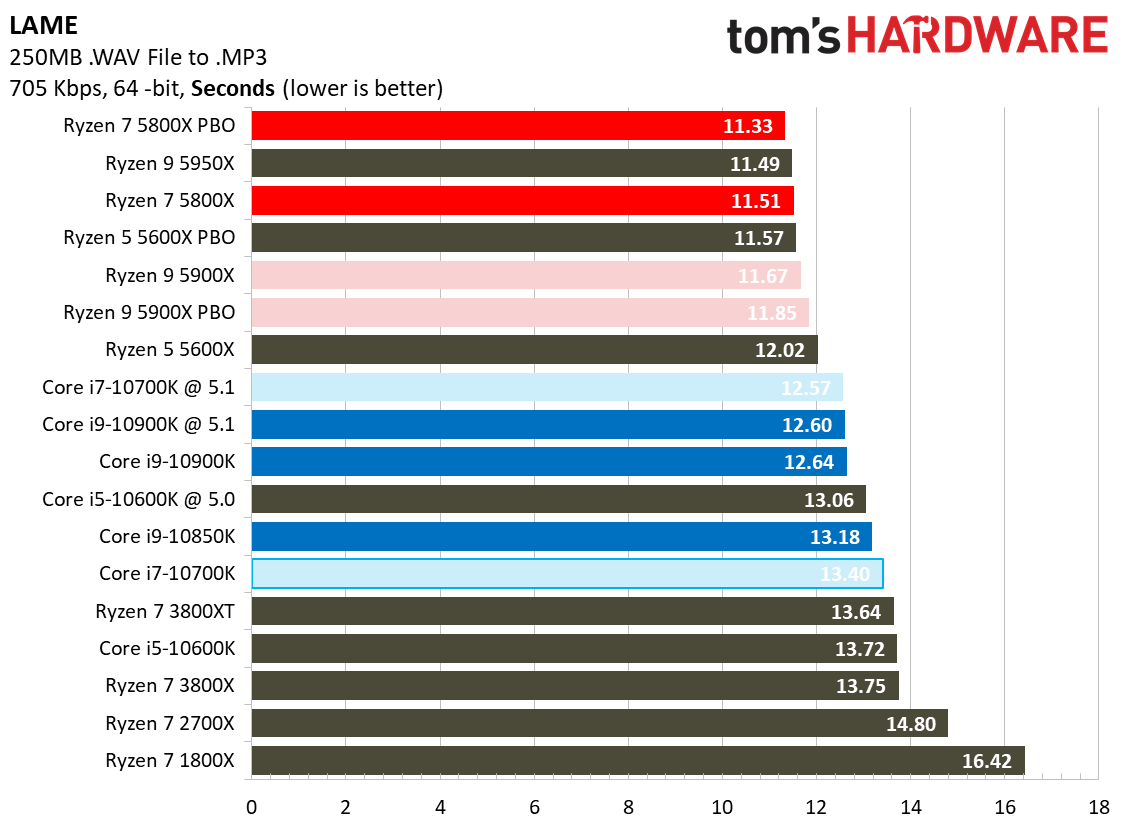
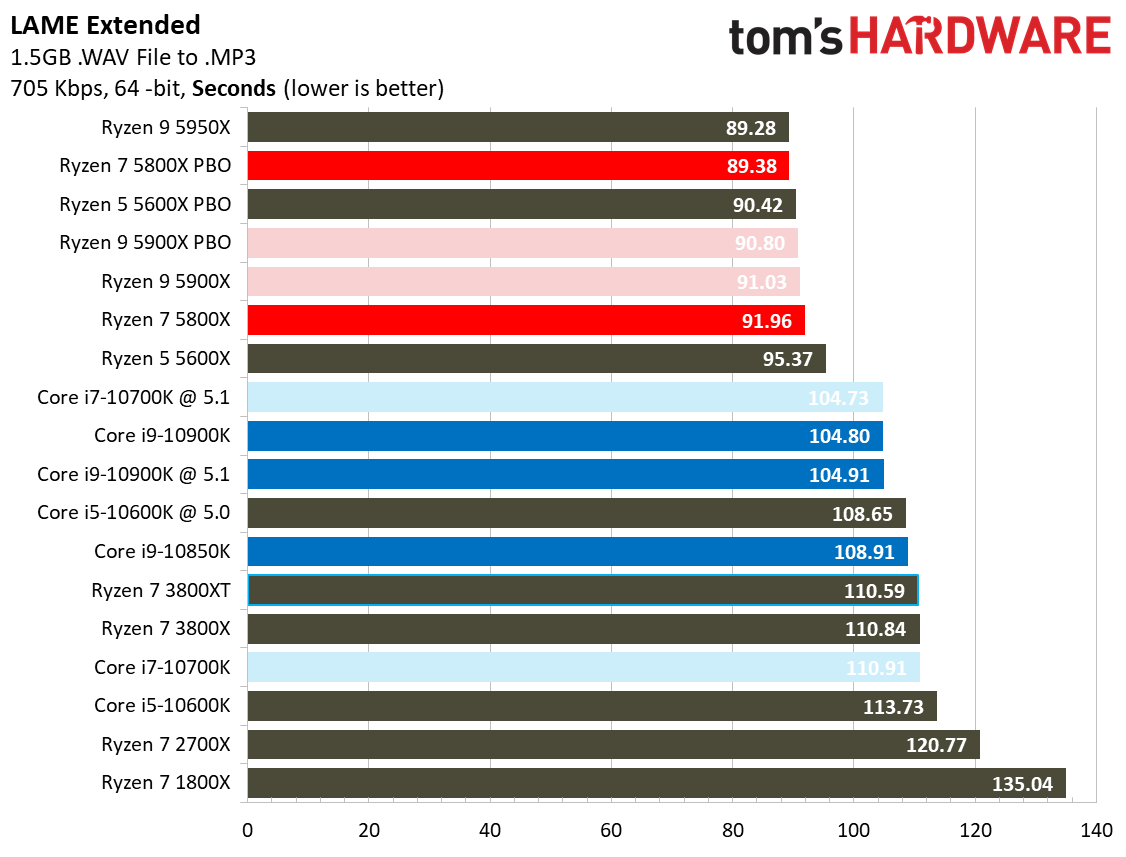
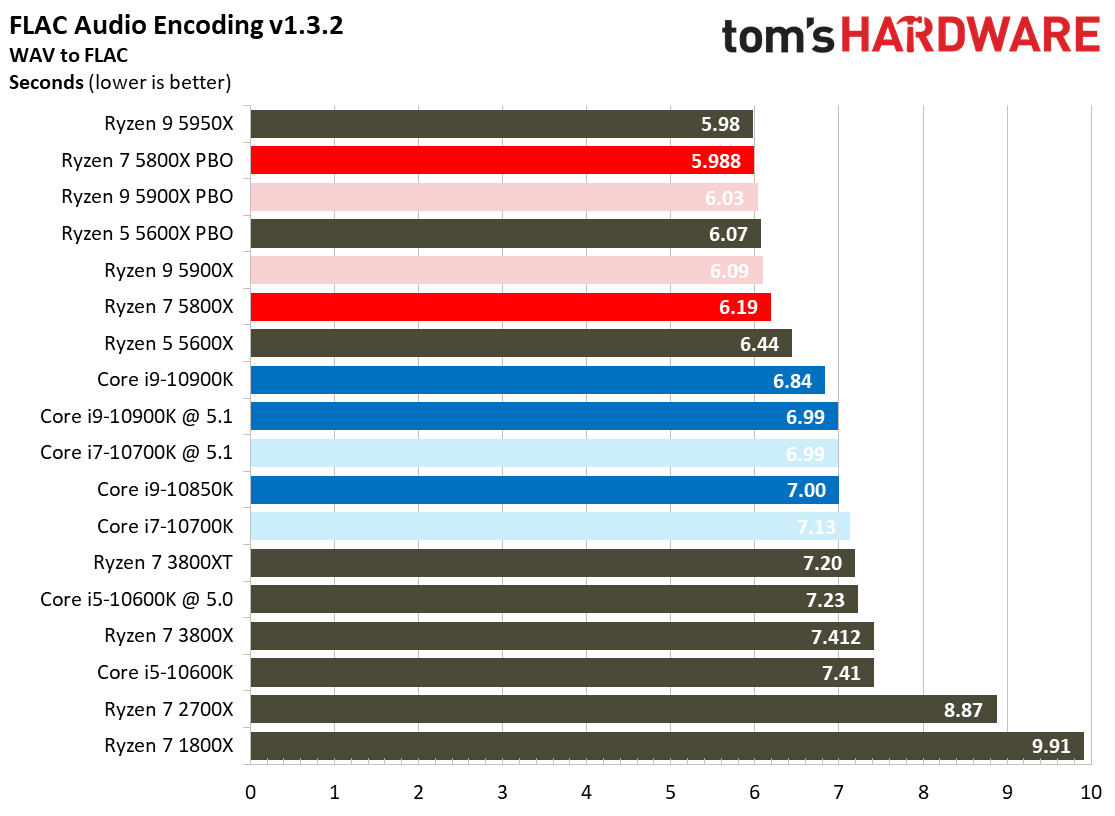
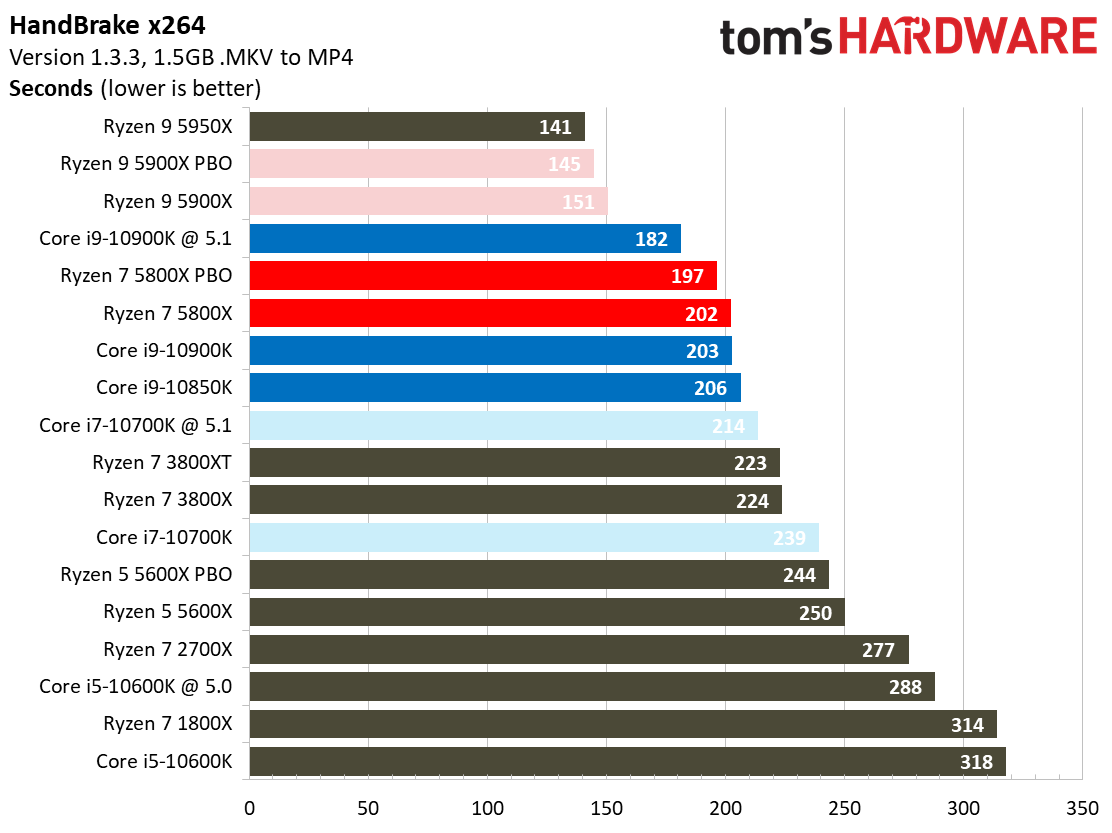
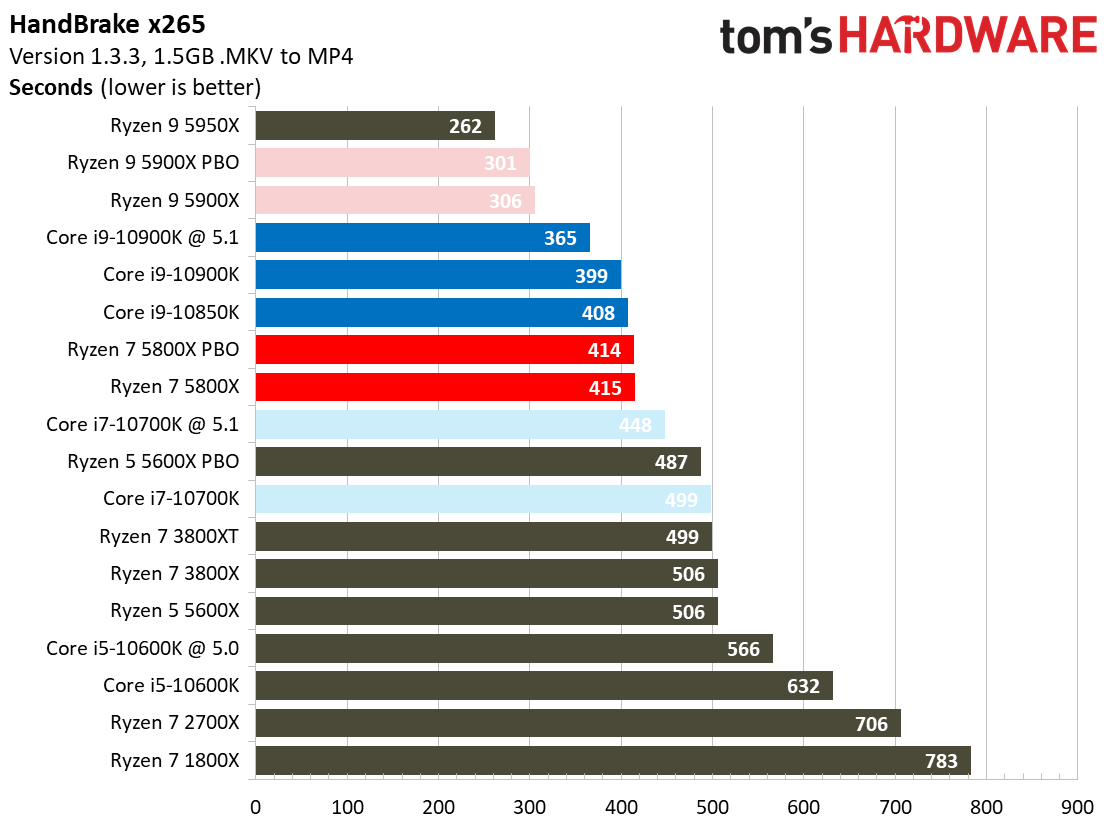
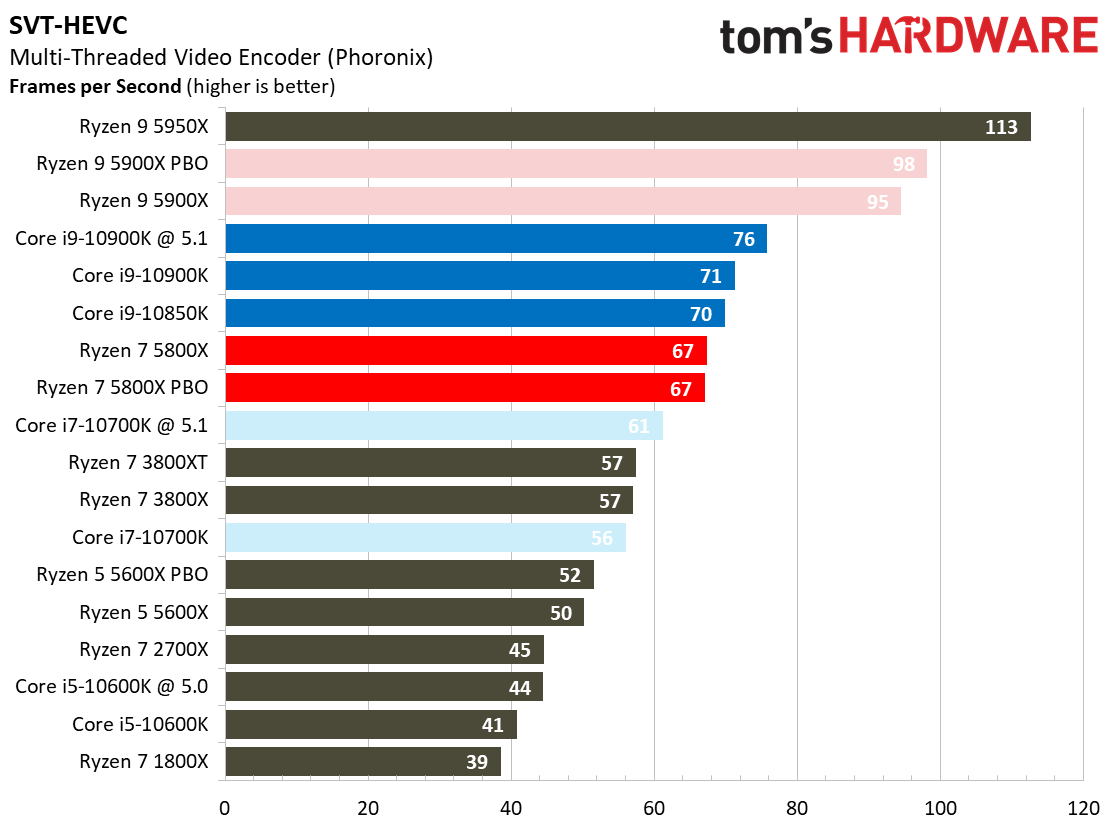
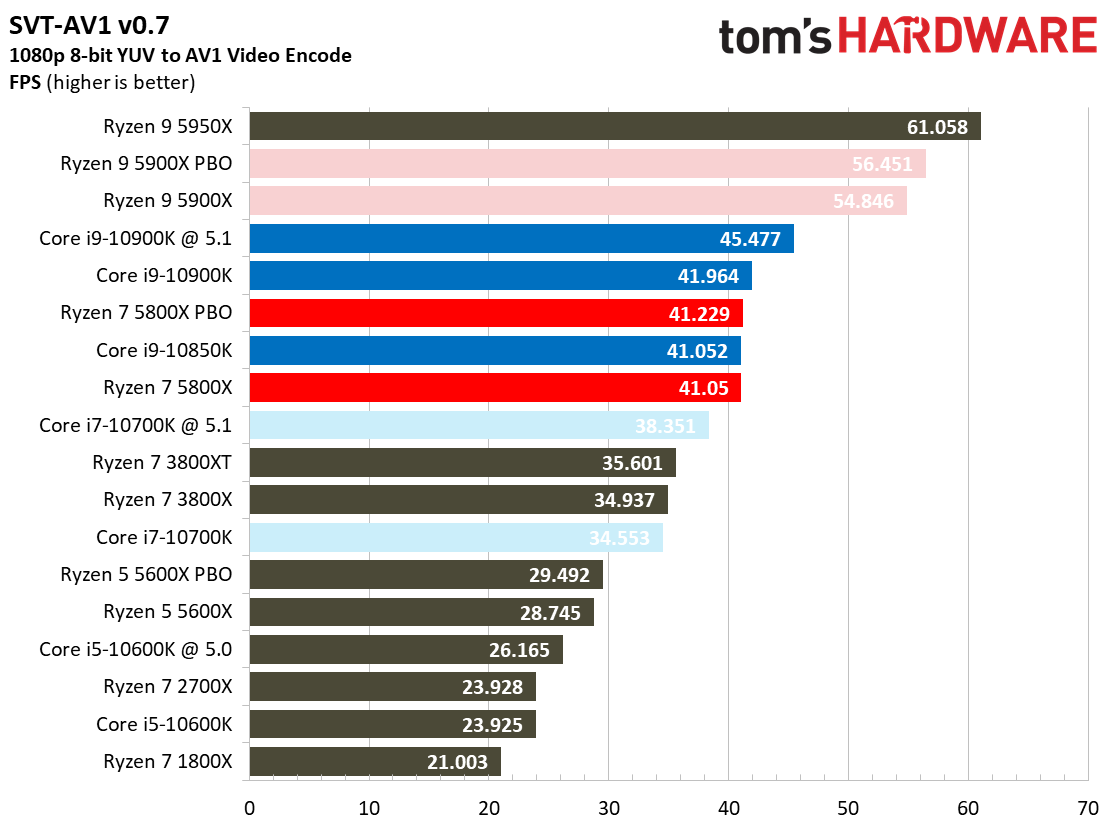
Our encoding tests include benchmarks that respond best to single-threaded performance, like the quintessential examples LAME and FLAC, but the SVT-AV1 and SVT-HEVC tests represent a newer class of threaded encoders. Regardless of the type of encoder, though, AMD's Zen 3 chips impress.
The Ryzen 7 5800X takes an easy lead in the LAME tests, beating the fastest comparable Zen 3 chips in the short test, but trailing the 5950X slightly in the extended benchmark. The Intel chips trail by surprising margins. Again, take a glance at the previous-gen AMD chips for a sense of how far the company has come in a few short years.
The Ryzen 7 5800X leads the Intel i9 and i7 models in the AVX-light x264 HandBrake benchmark, but the Core i9 chips take the lead in the AVX-heavy x265 flavor of the test due to their heavier core counts. The Intel i9 models also take the lead in the SVT-HEVC benchmark and essentially tie the 5800X in the AV1 workload at stock settings.
Web Browsing on Ryzen 7 5800X
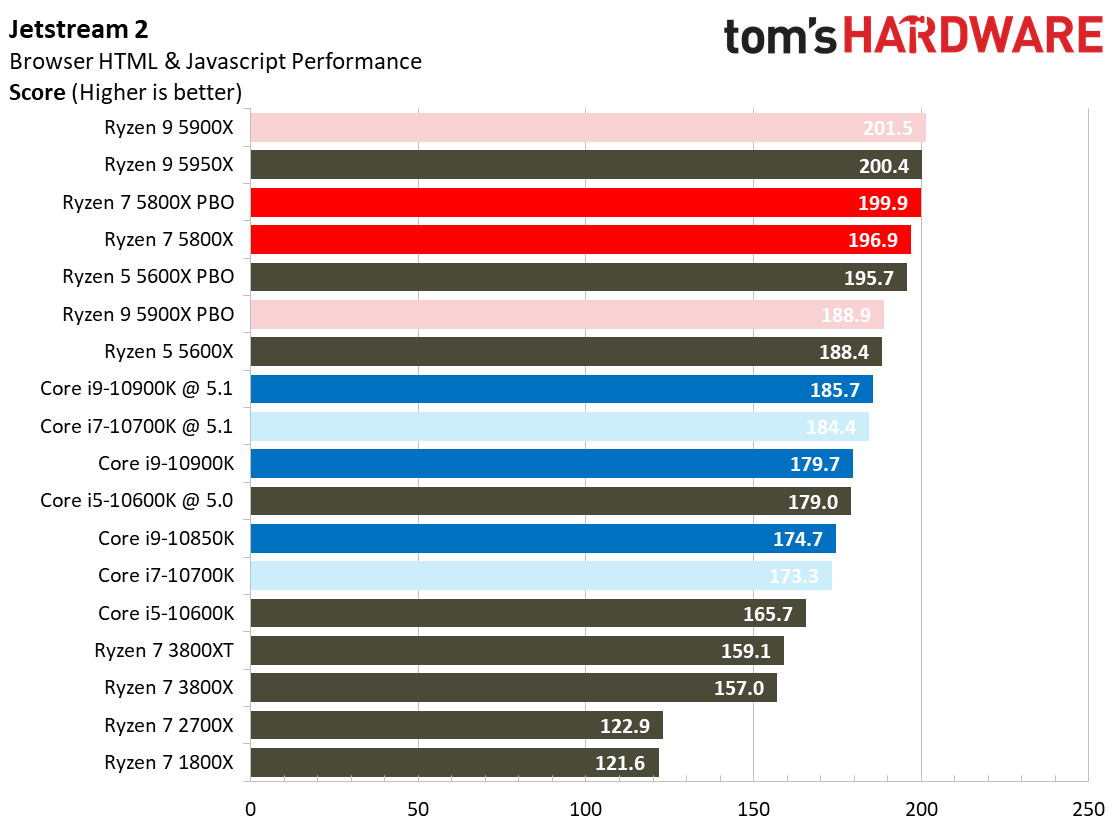
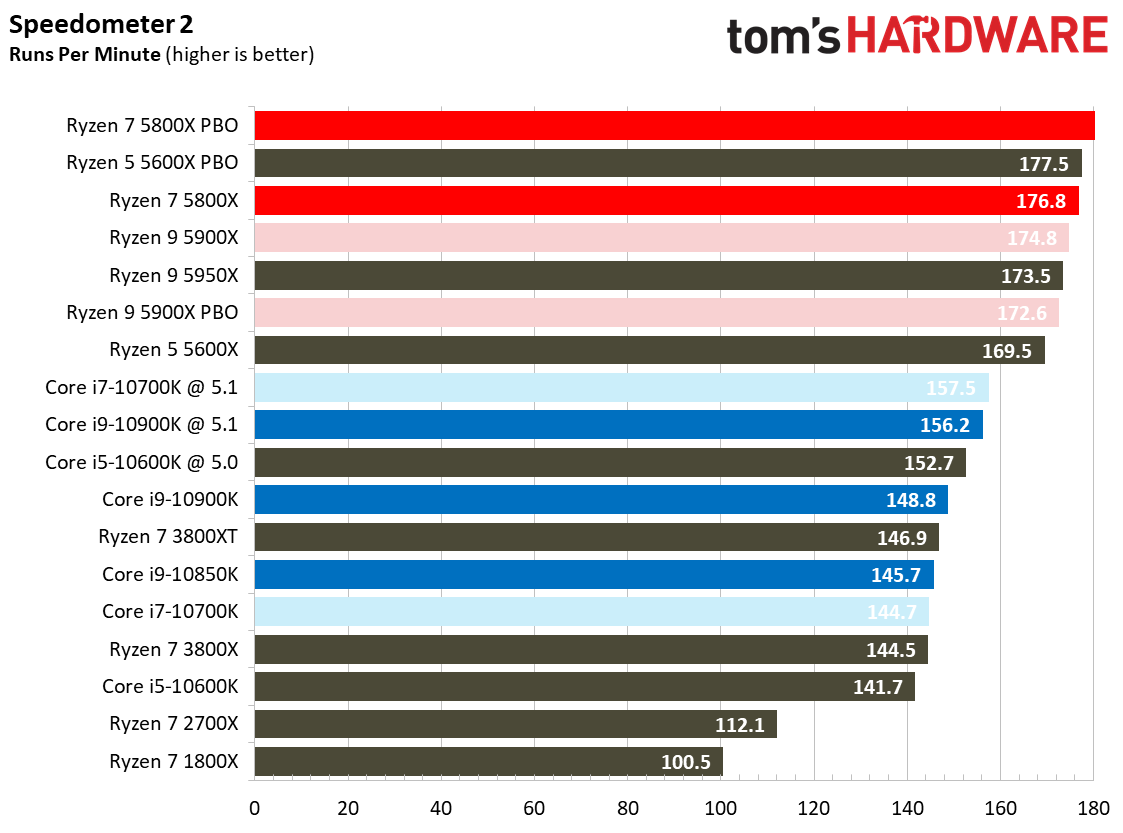
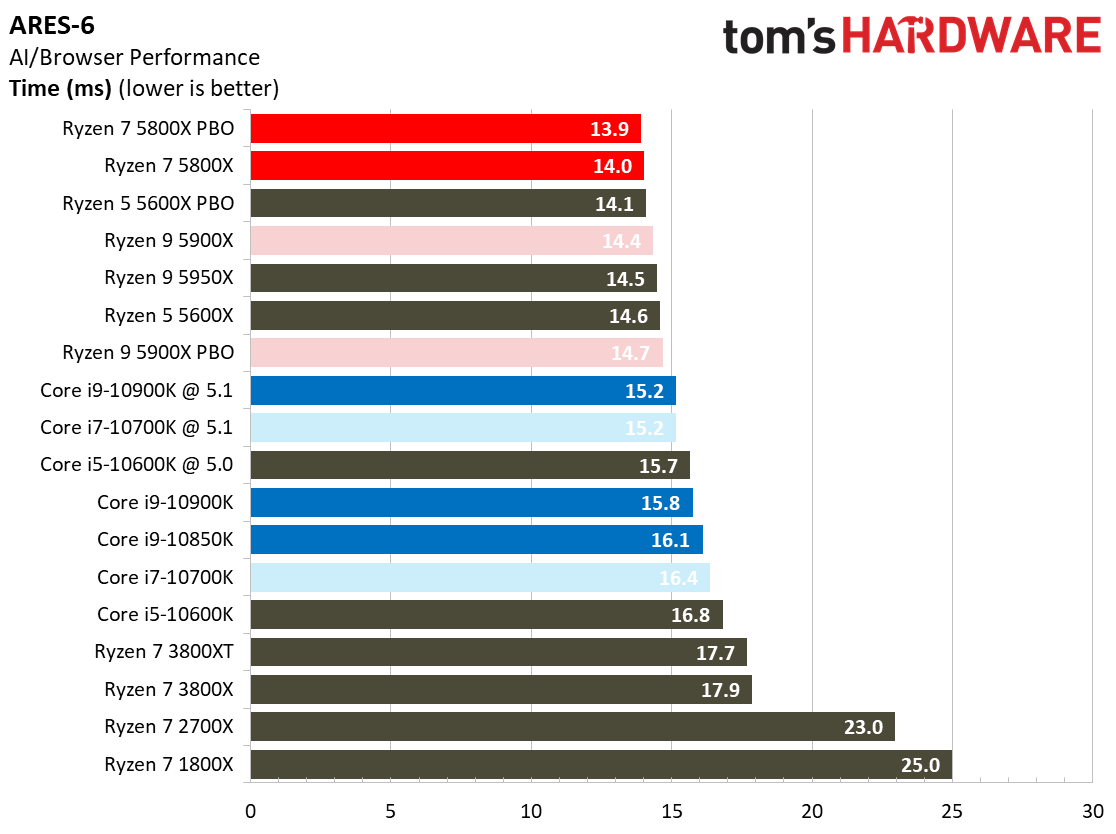
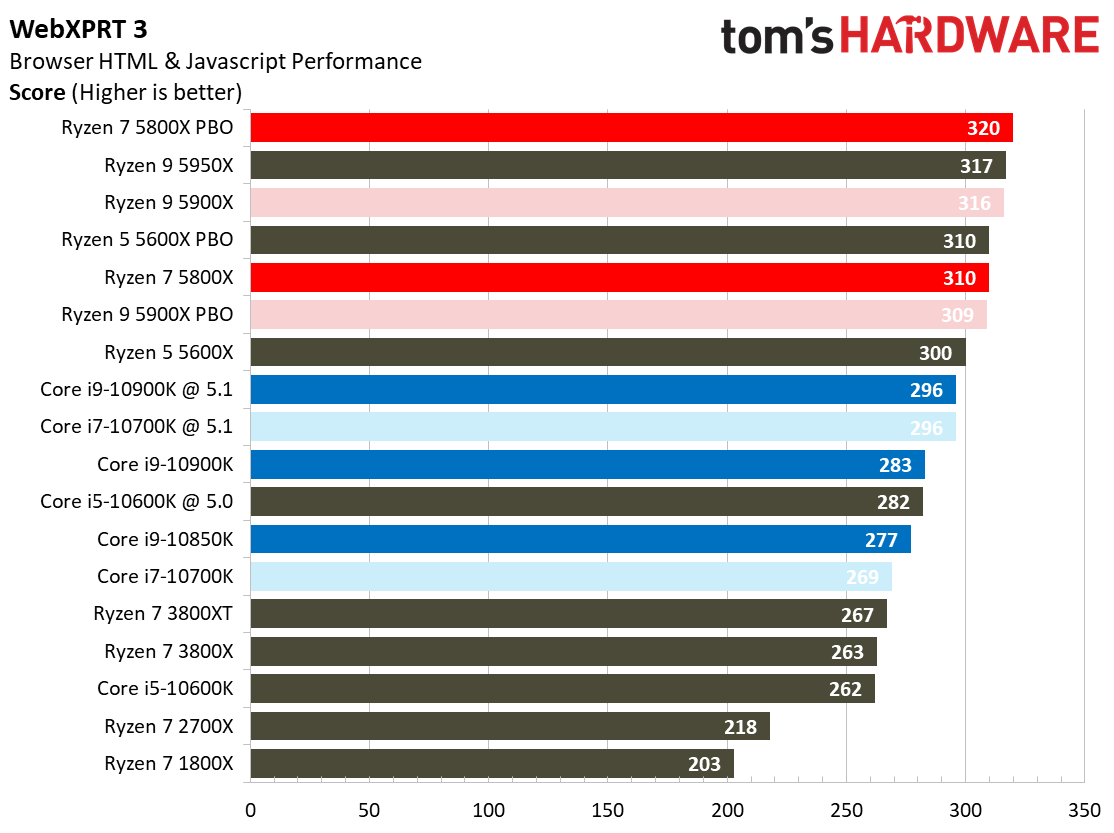
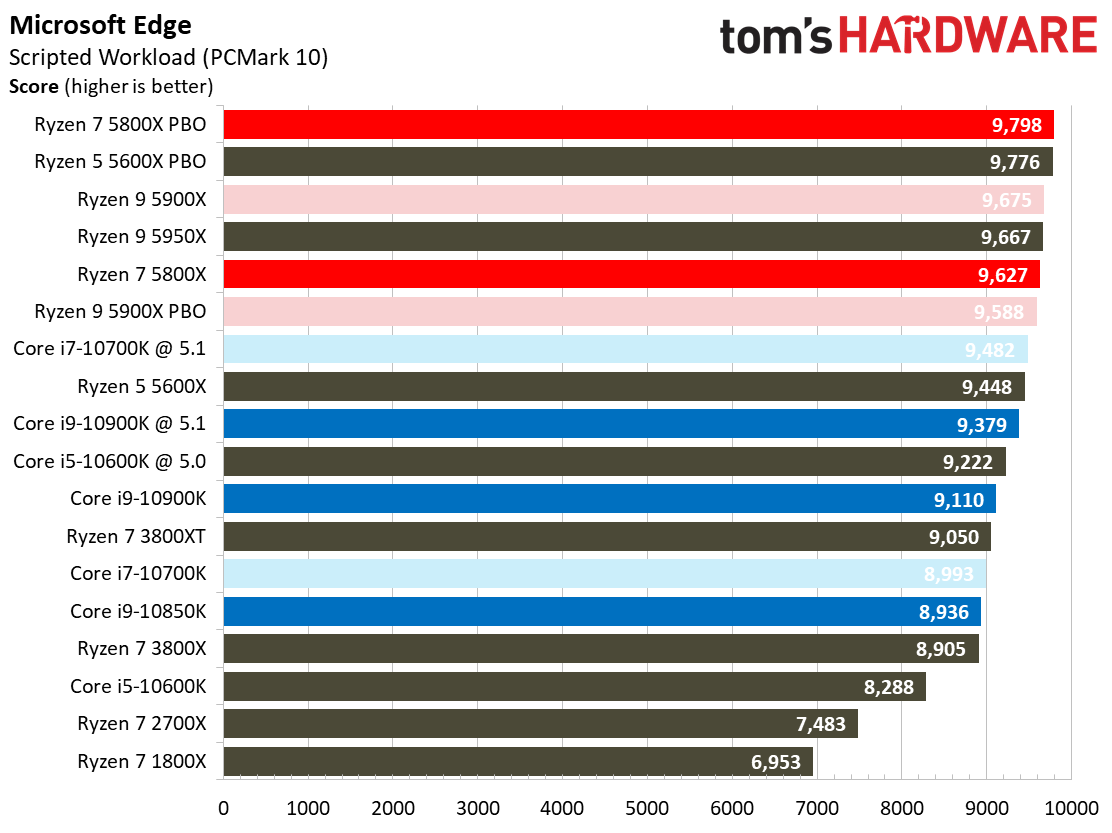
We test all of these benchmarks in a version-locked Chrome browser, with the notable exception of the Edge test. Intel has really taken quite the performance haircut in web browsers over the last two years, largely due to mitigations for its nagging security concerns.
Regardless, these benchmarks are almost exclusively lightly-threaded, so Intel has long held the top of the charts despite the mitigations. From the AI-heavy ARES-6 to WebXPRT3's Javascript tests, and even extending to Jetstream 2, the Ryzen 7 5800X. like the rest of the Zen 3 lineup, beats every overclocked Intel chip - but at stock settings.
The Edge browser, which typically responds well to high core-count chips without threading, stands out as the lone exception to Zen 3's domination of the web tests - the overclocked Core i7-10700K takes the lead over the stock Ryzen 5 5600X. However, the Ryzen 7 5800X maintains its lead over the Intel roster.
Office and Productivity on Ryzen 7 5800X
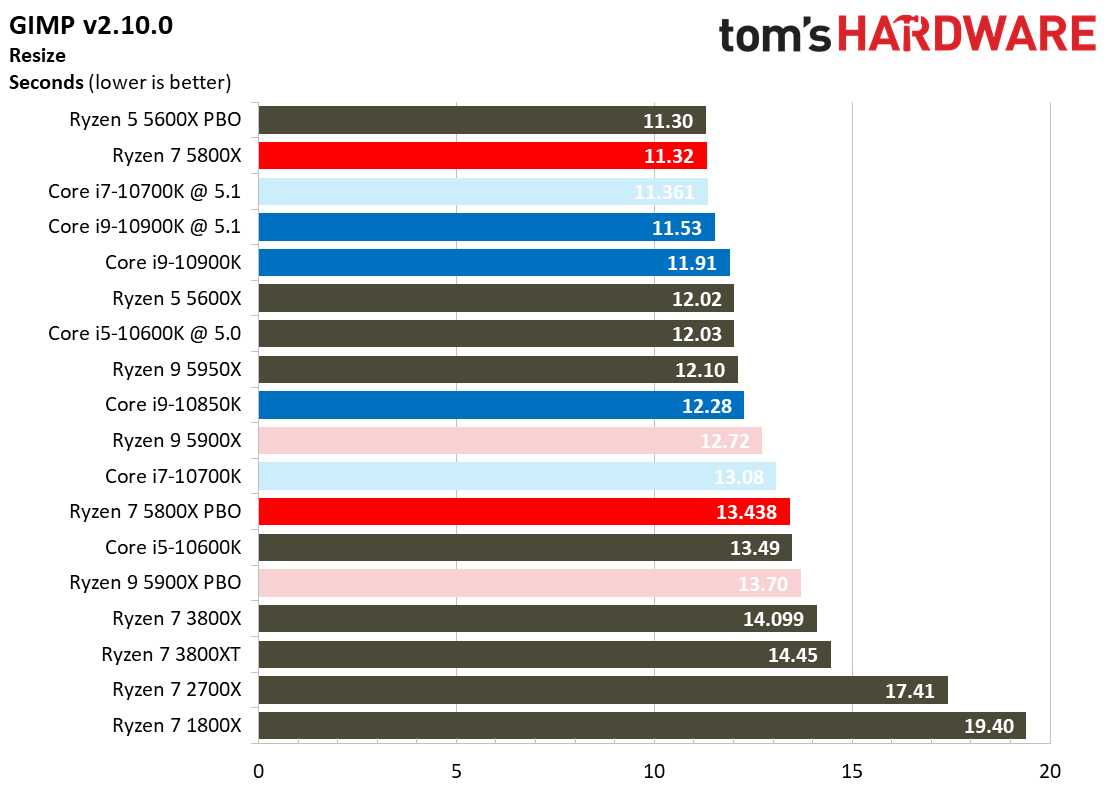
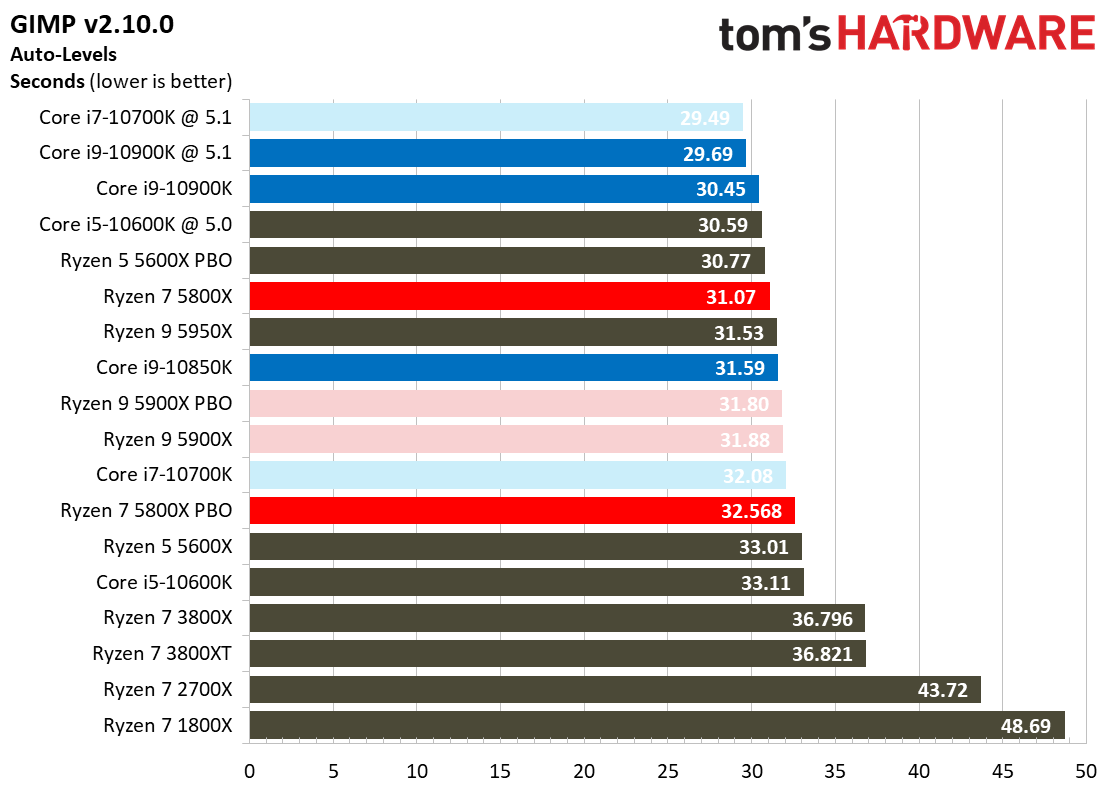
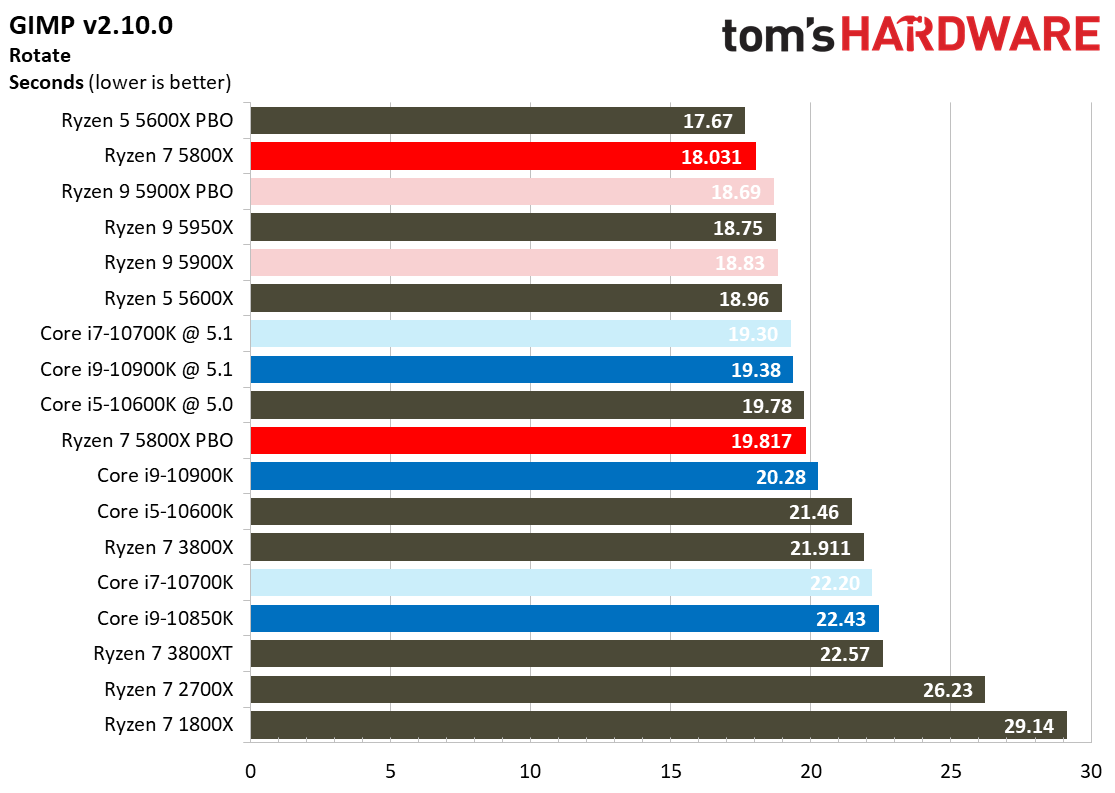
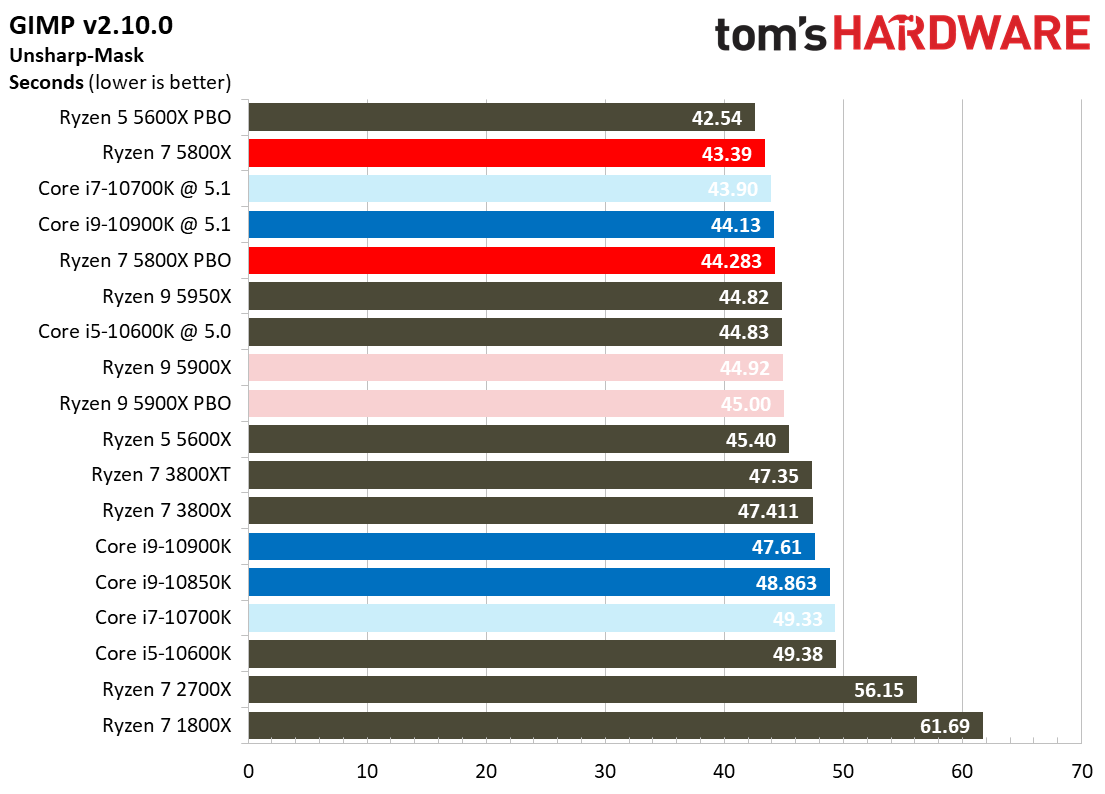
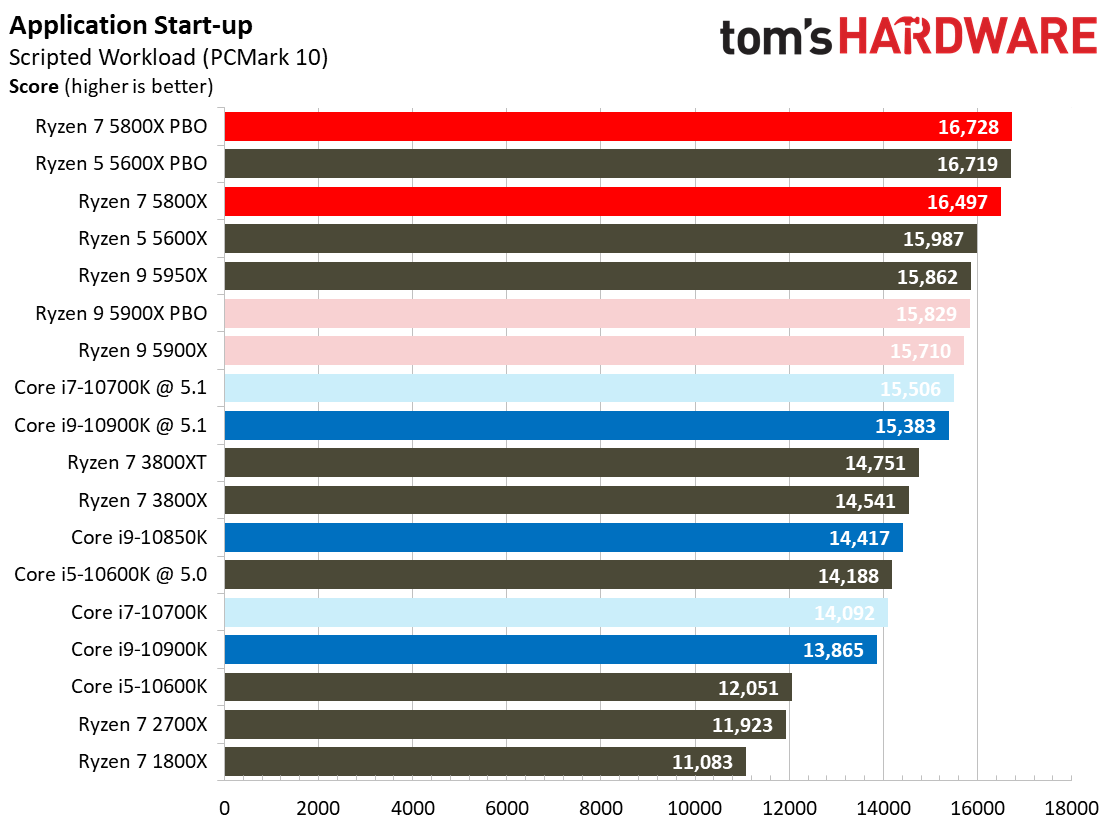
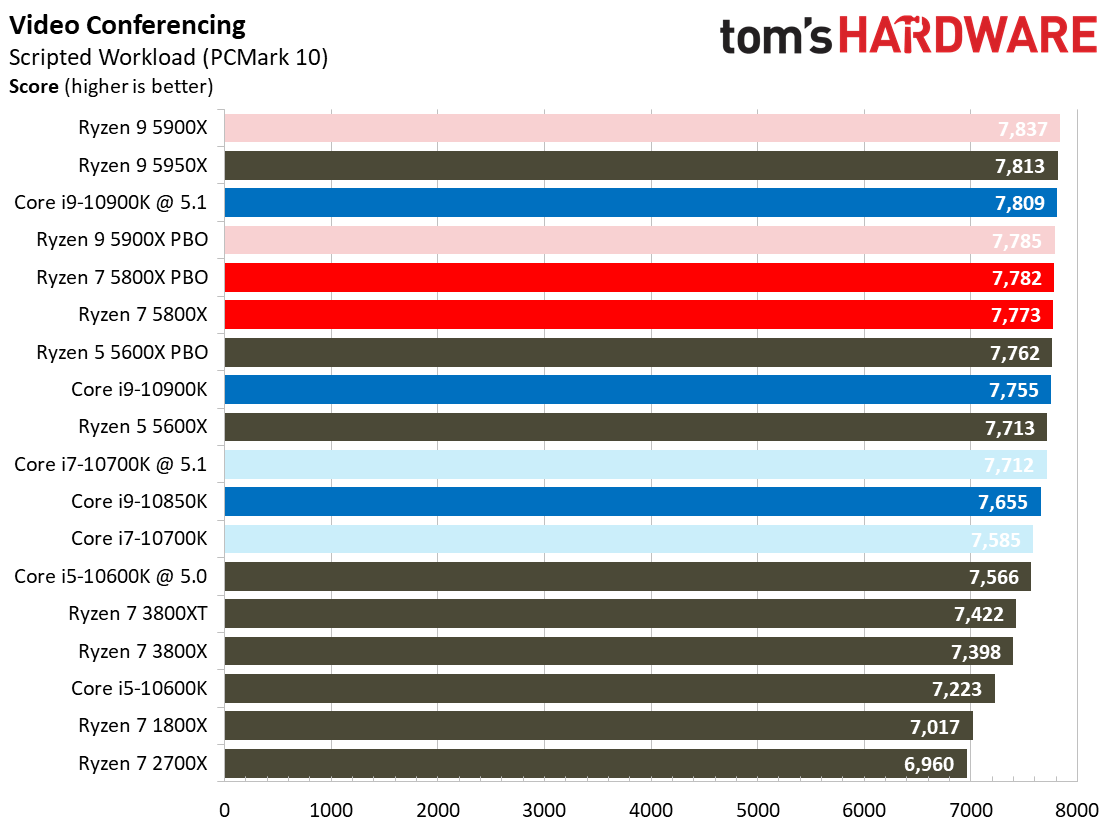
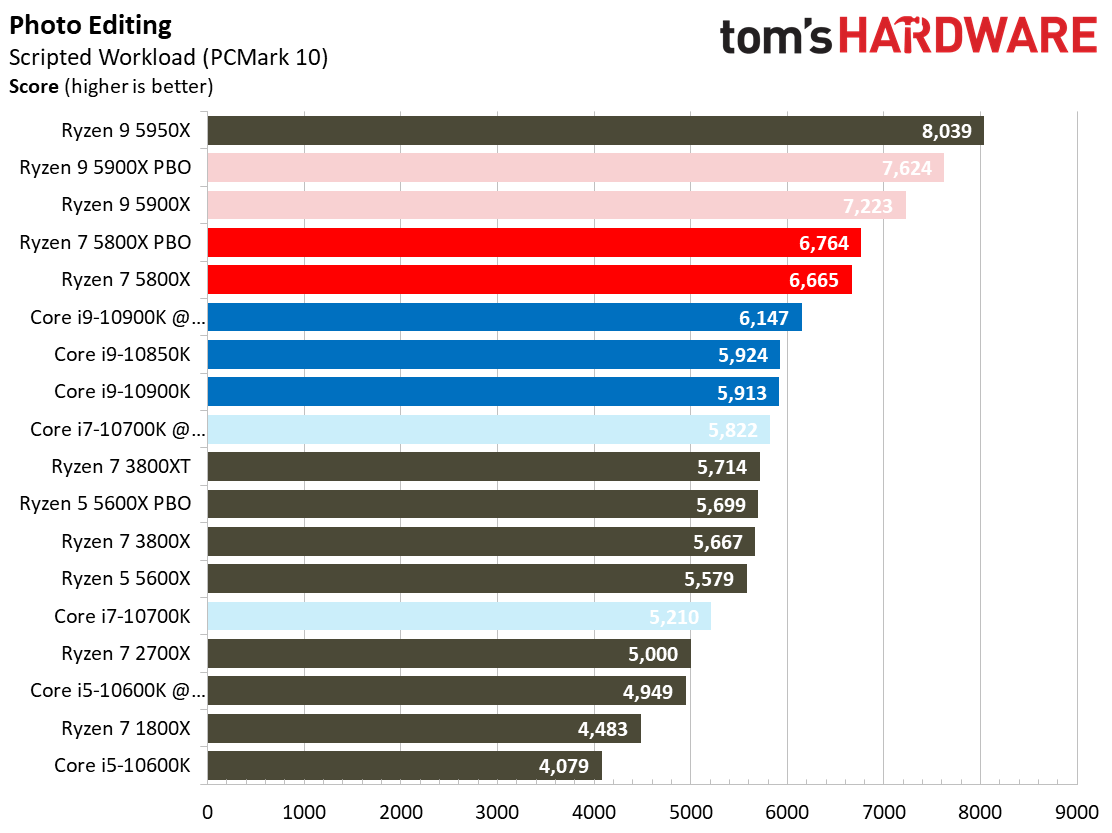
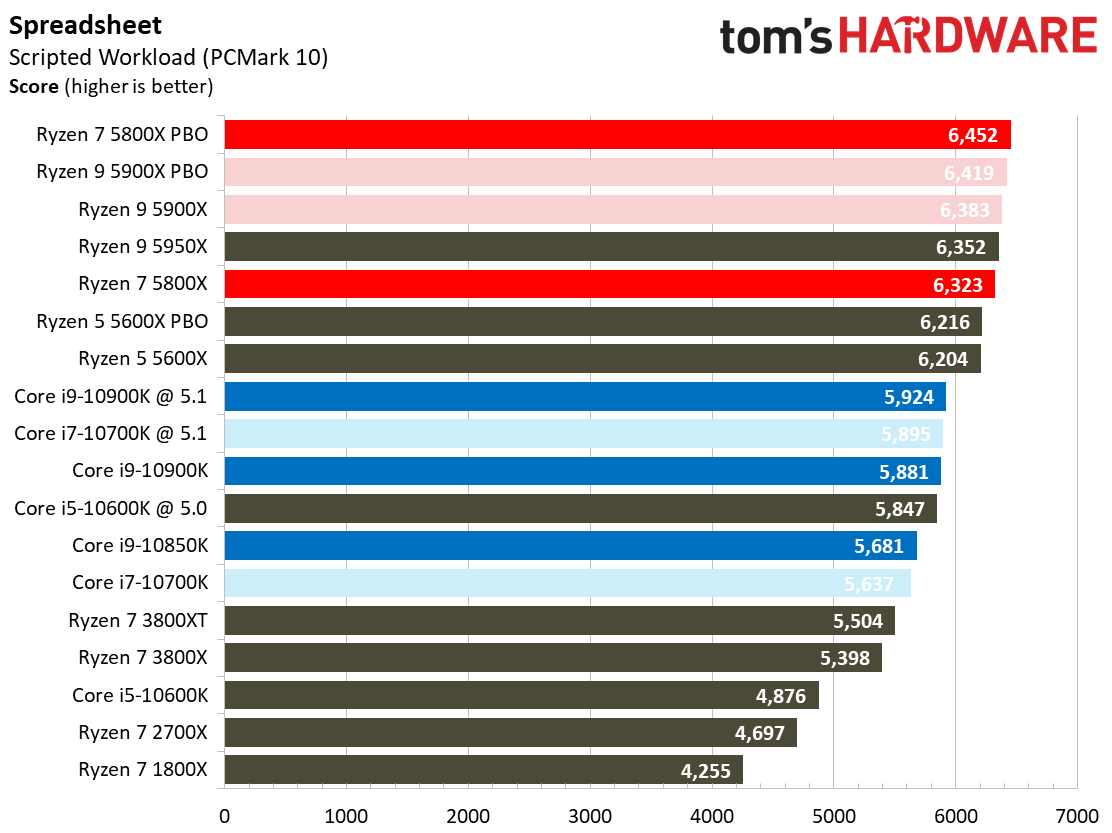
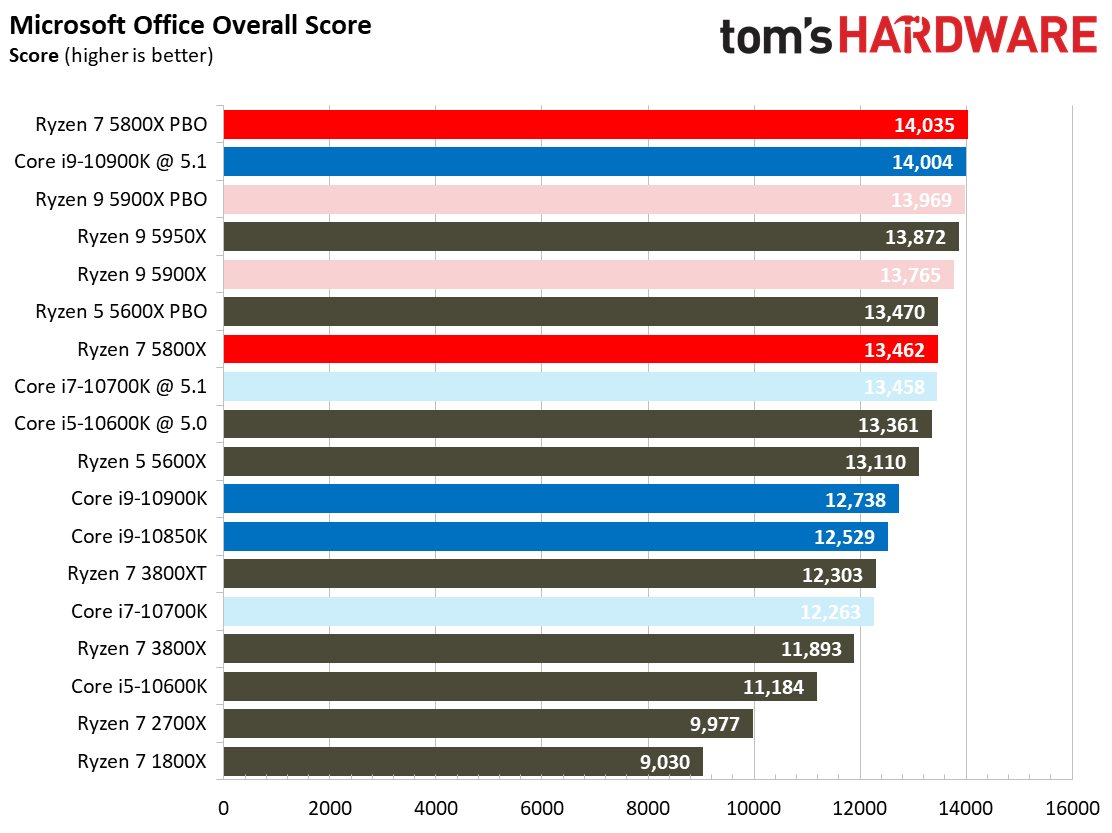
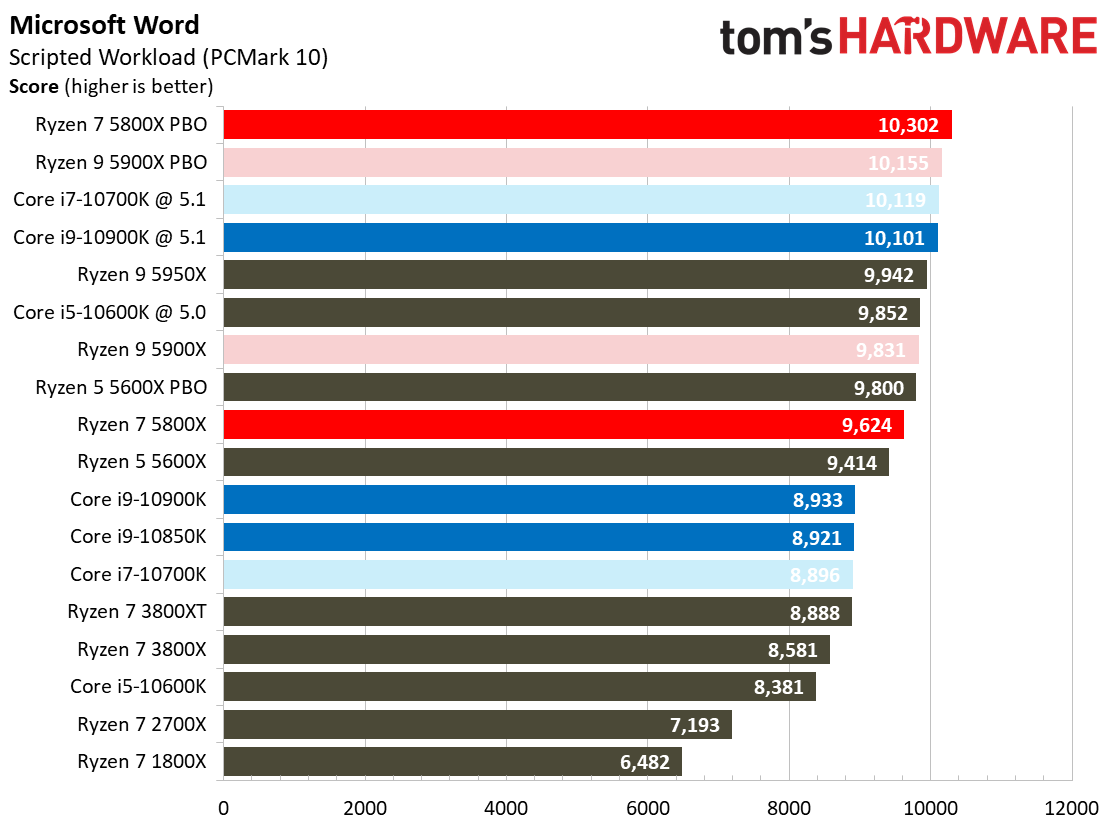
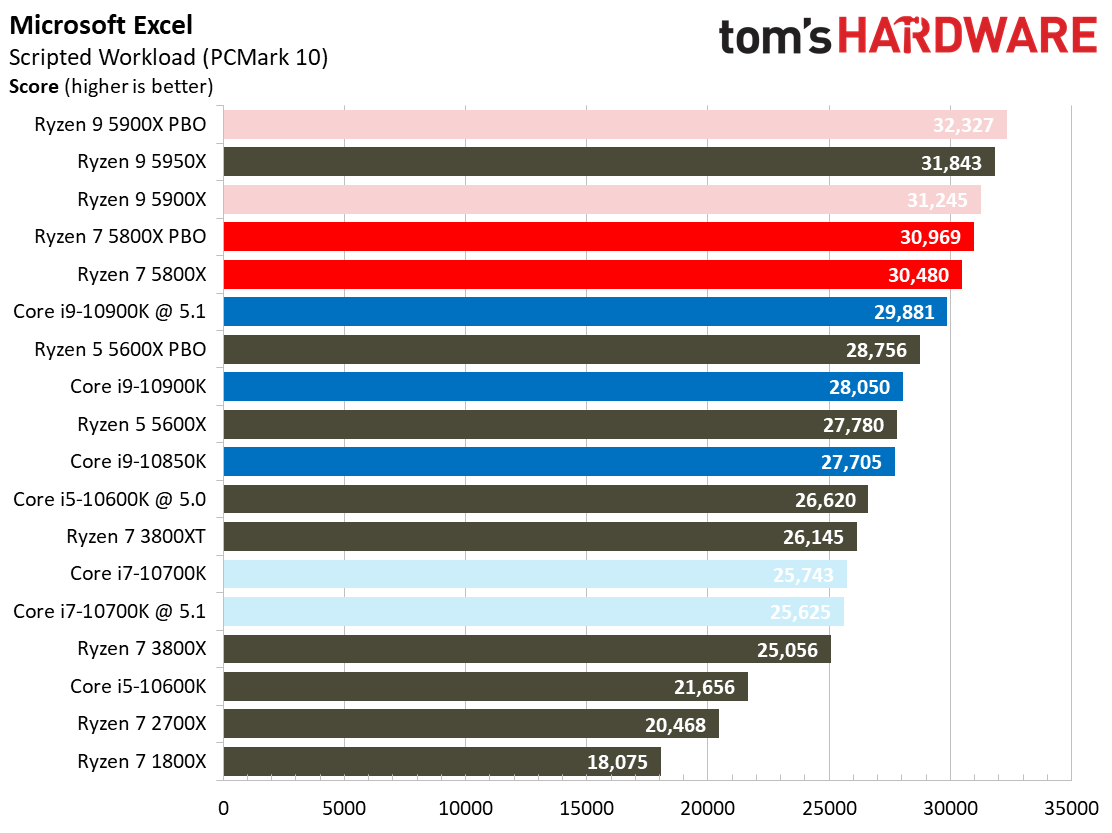
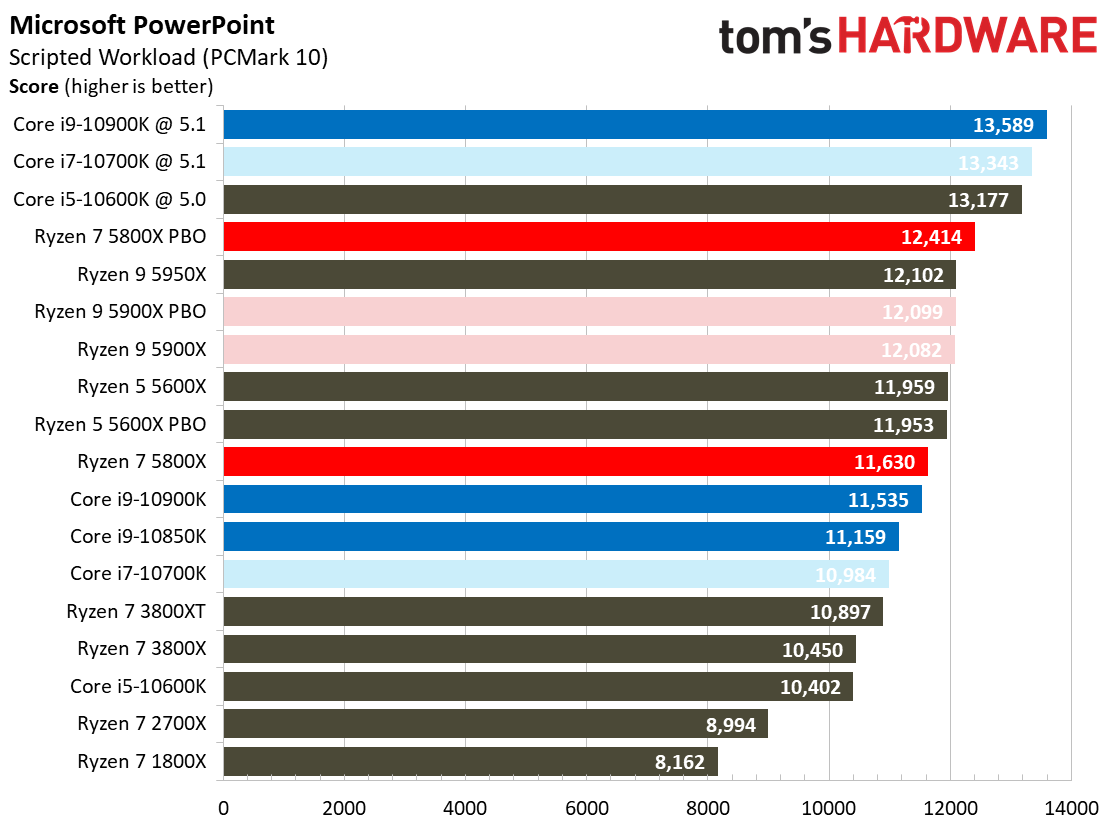
AMD's Ryzen 5000: Come for the gaming and rendering performance, but stay for the Office experience? OK, probably not. If you're looking to build a screaming-fast computer, you're probably not doing it to run office applications like Word at breakneck speeds. However, these types of applications are ubiquitous the world over, and snappy performance is important for daily tasks. This is another area that AMD has long offered middling performance, but as you can see from the previous-gen models in the charts, Zen 3 climbs the ranks impressively.
For a perfect example of how the Ryzen 5000 chips deliver new levels of snappiness, look no further than the application start-up benchmark. The Ryzen 7 5800X leads the field in this benchmark, surpassing all other Ryzen 5000 models at stock settings.
The Ryzen 7 5800X also puts up a strong show in threaded benchmarks, like photo editing and video conferencing, and ekes past the overclocked 10900K in the overall score of the Microsoft Office test suite.
Compilation, Compression, AVX Performance on Ryzen 7 5800X
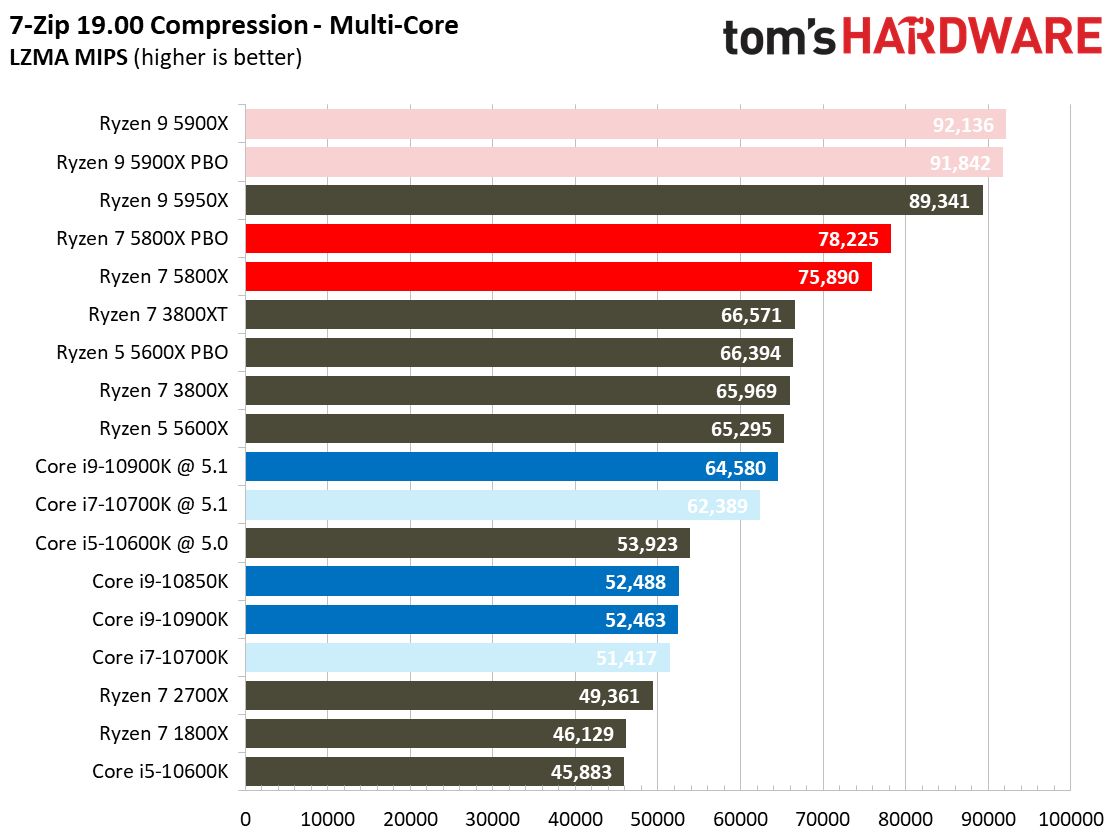
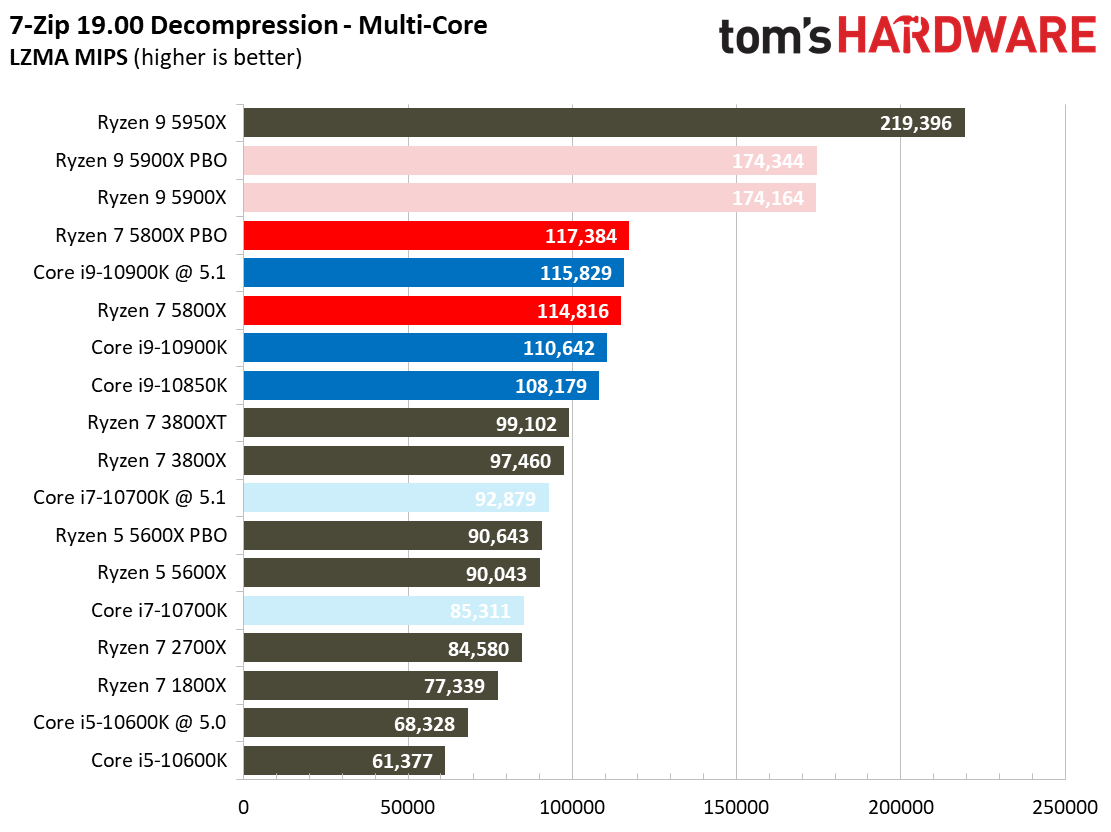
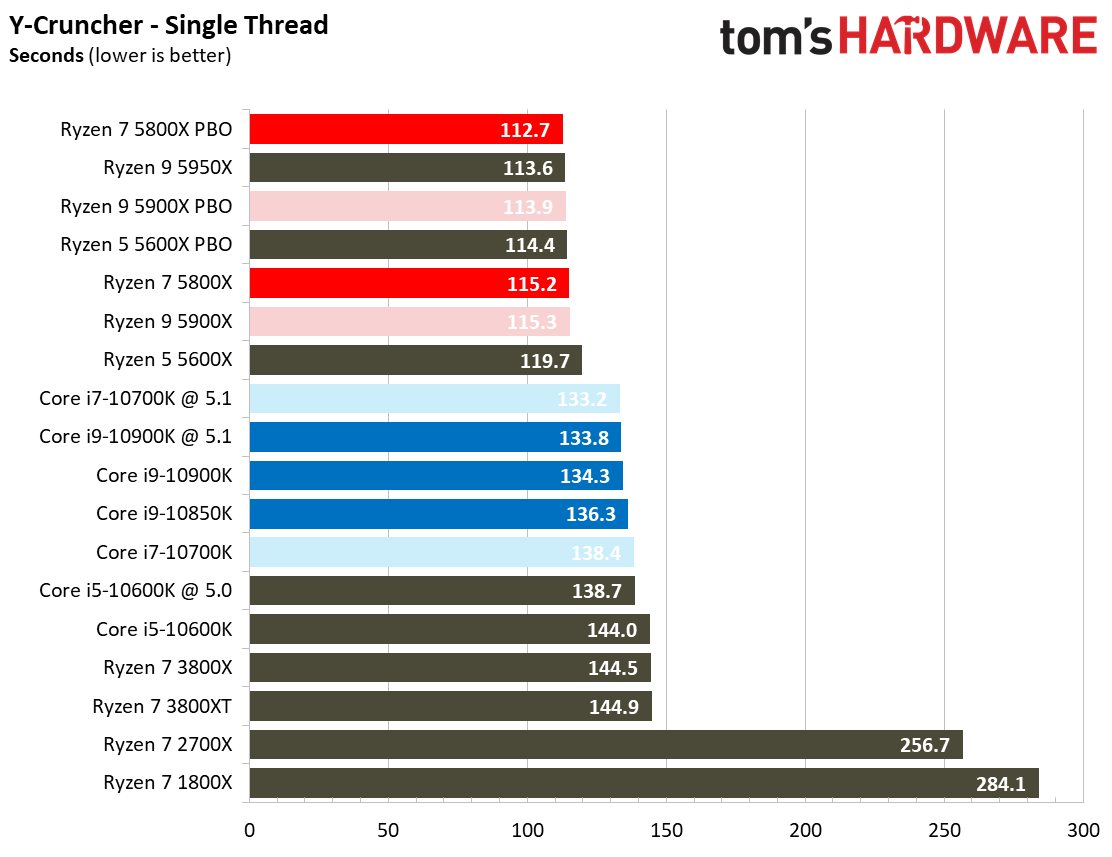
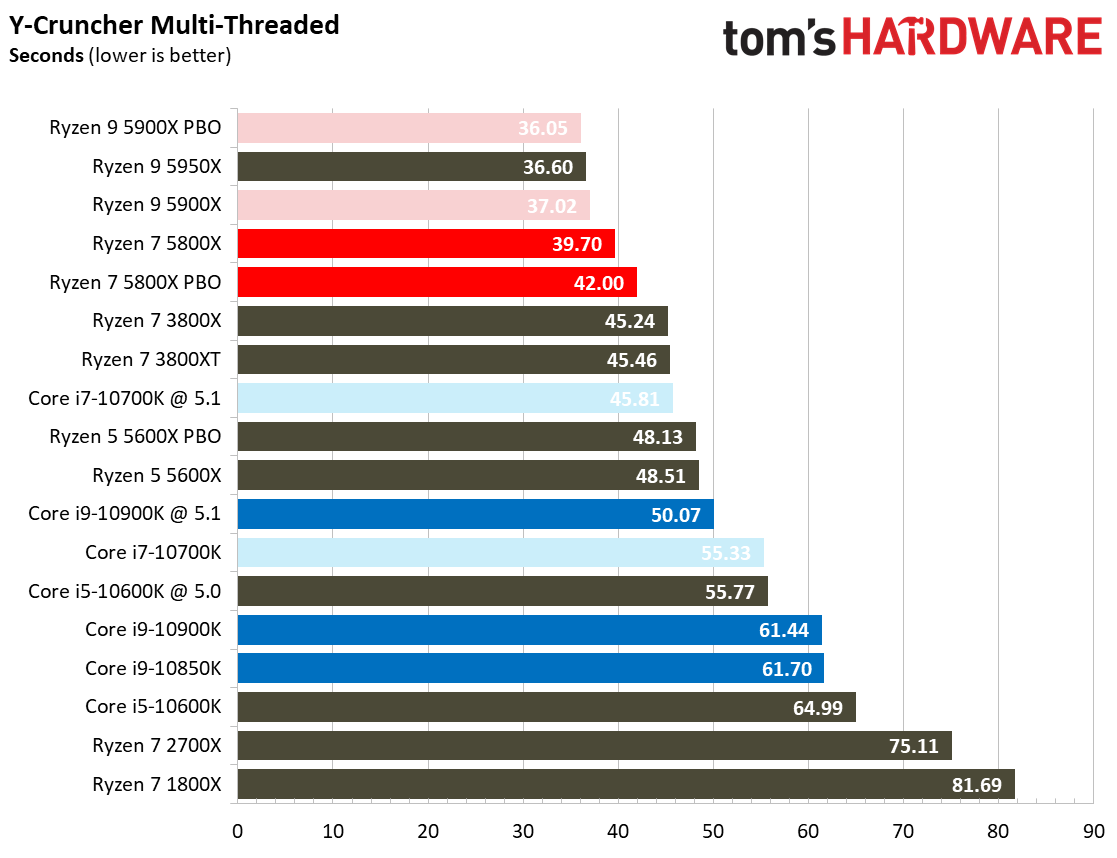
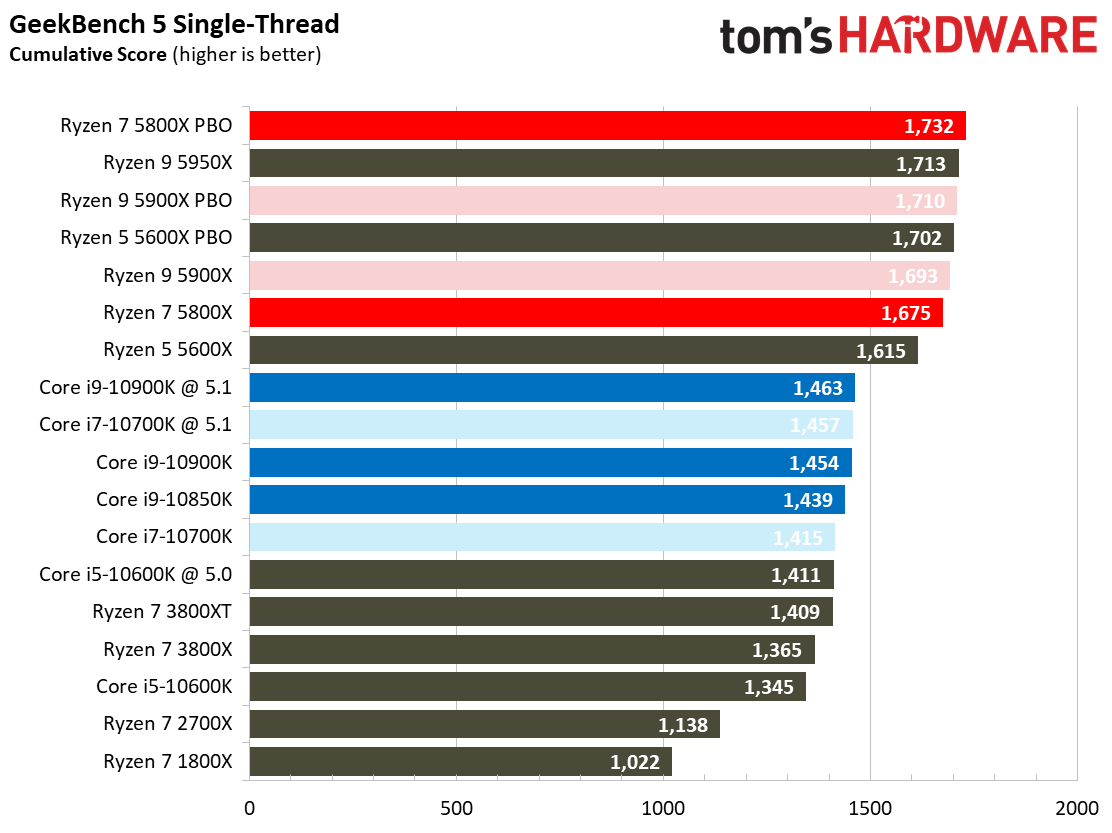
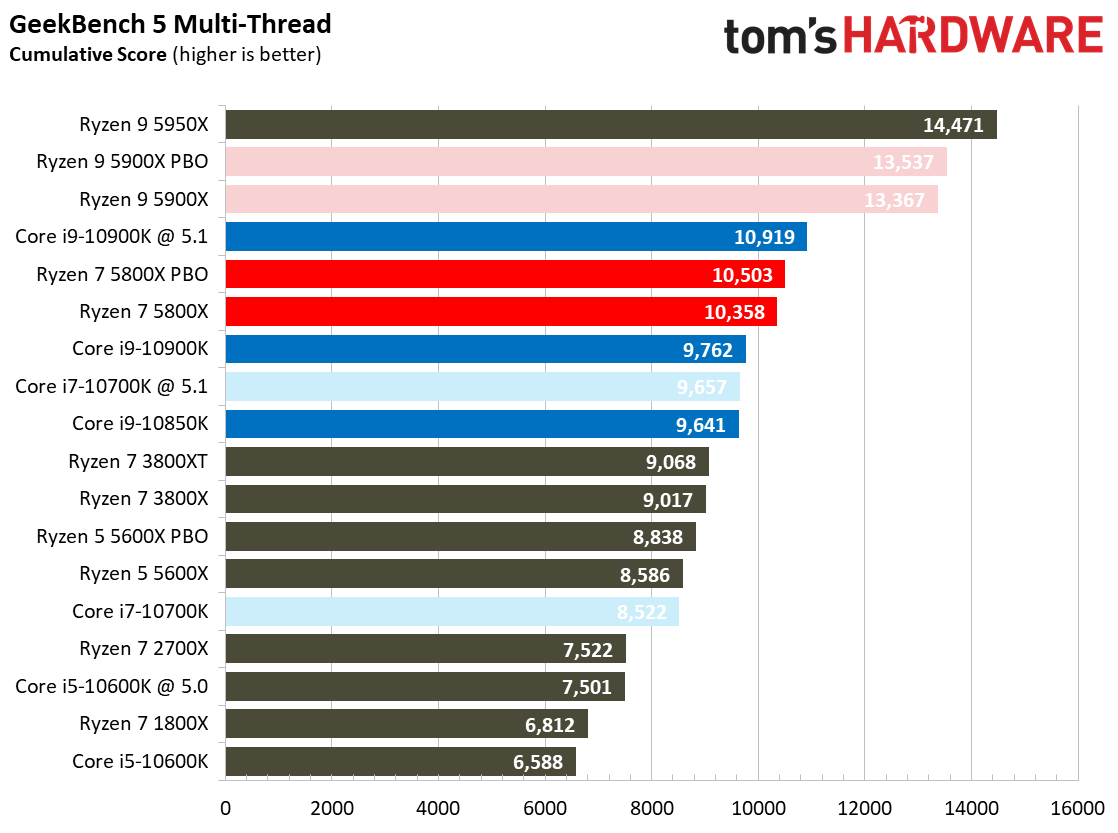
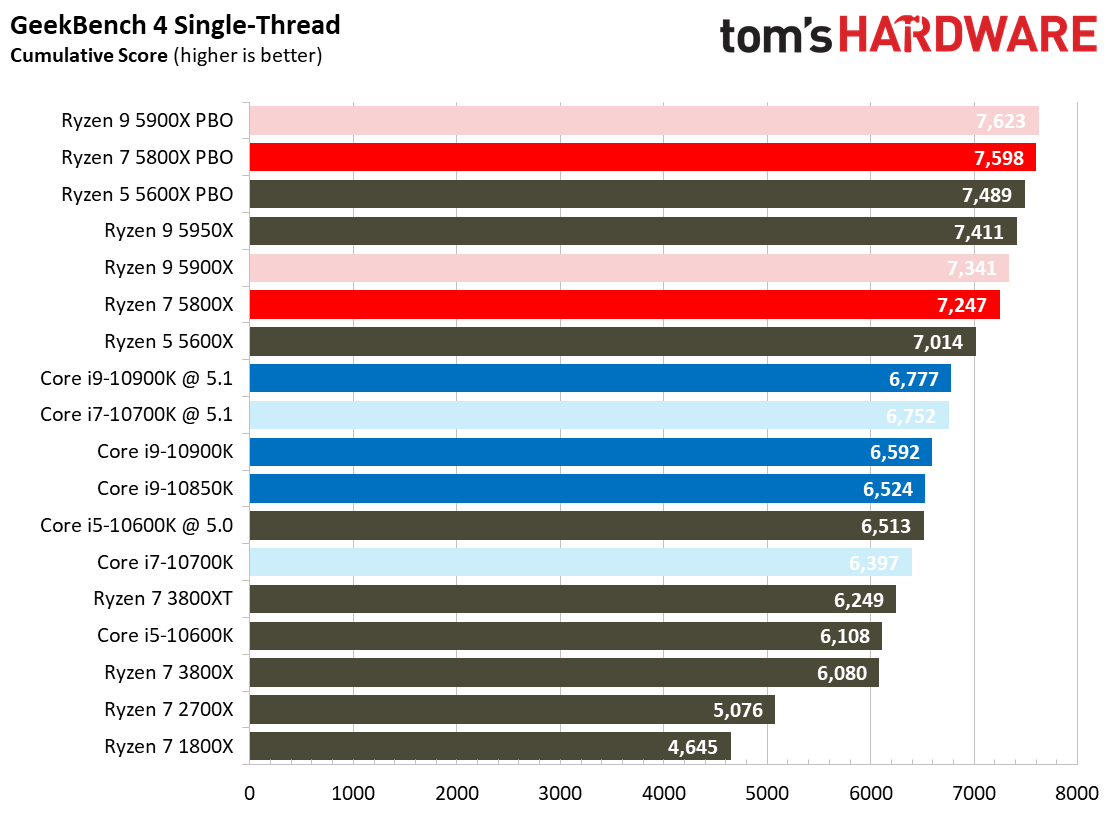
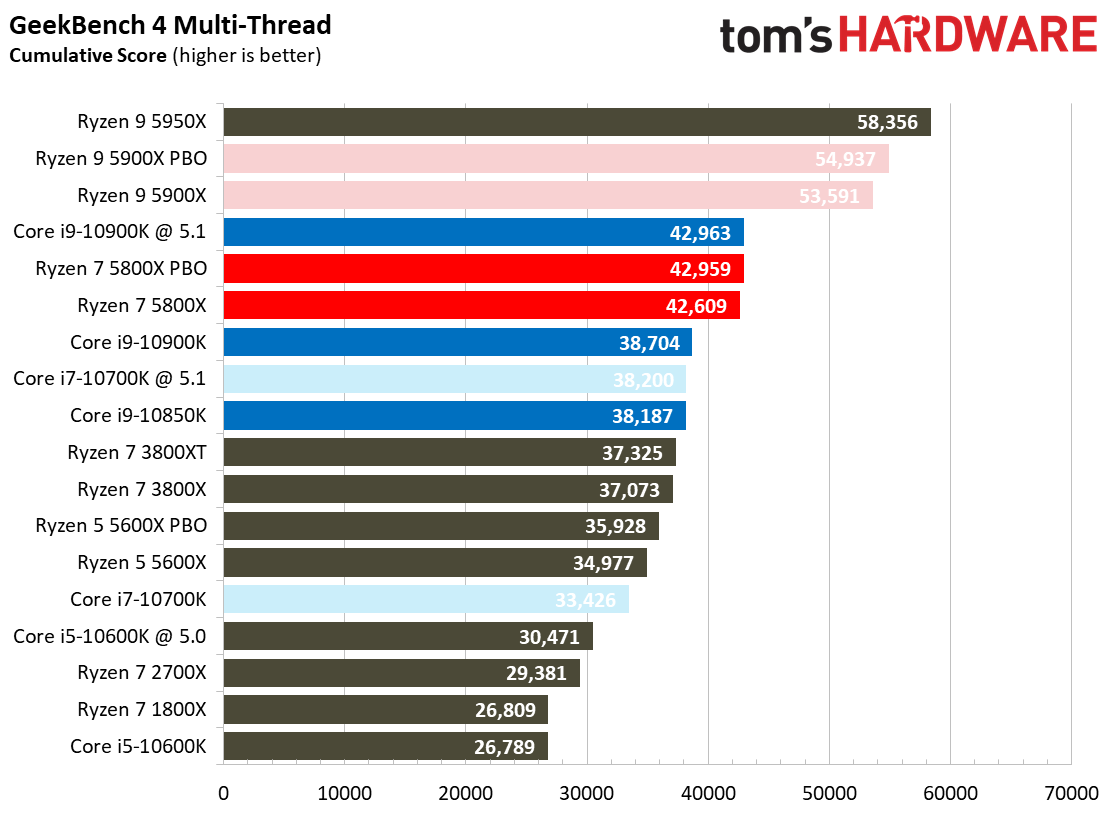
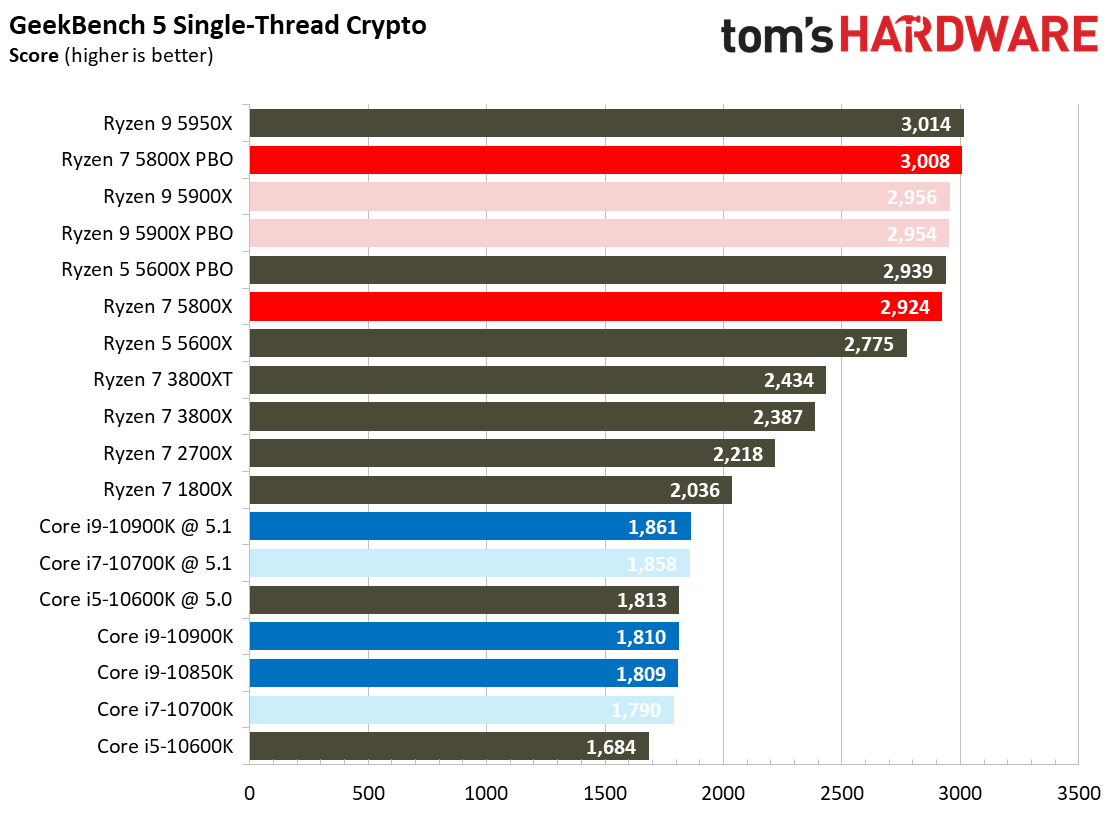
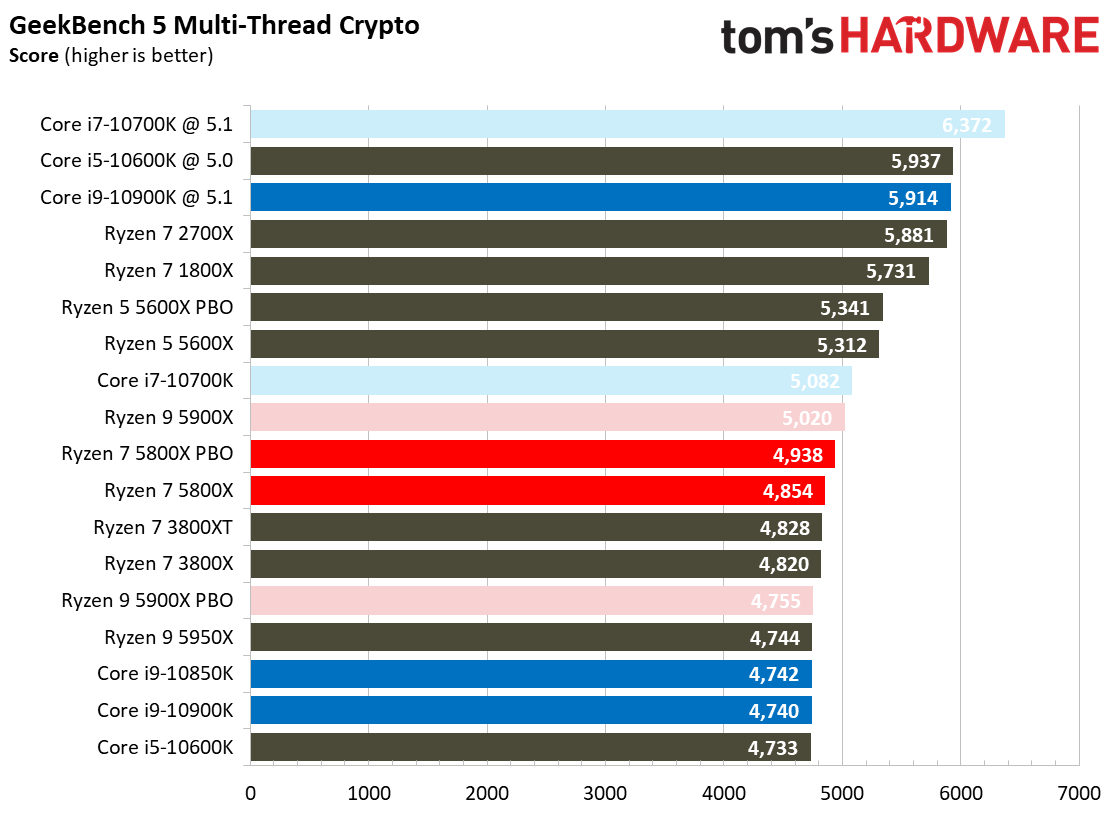
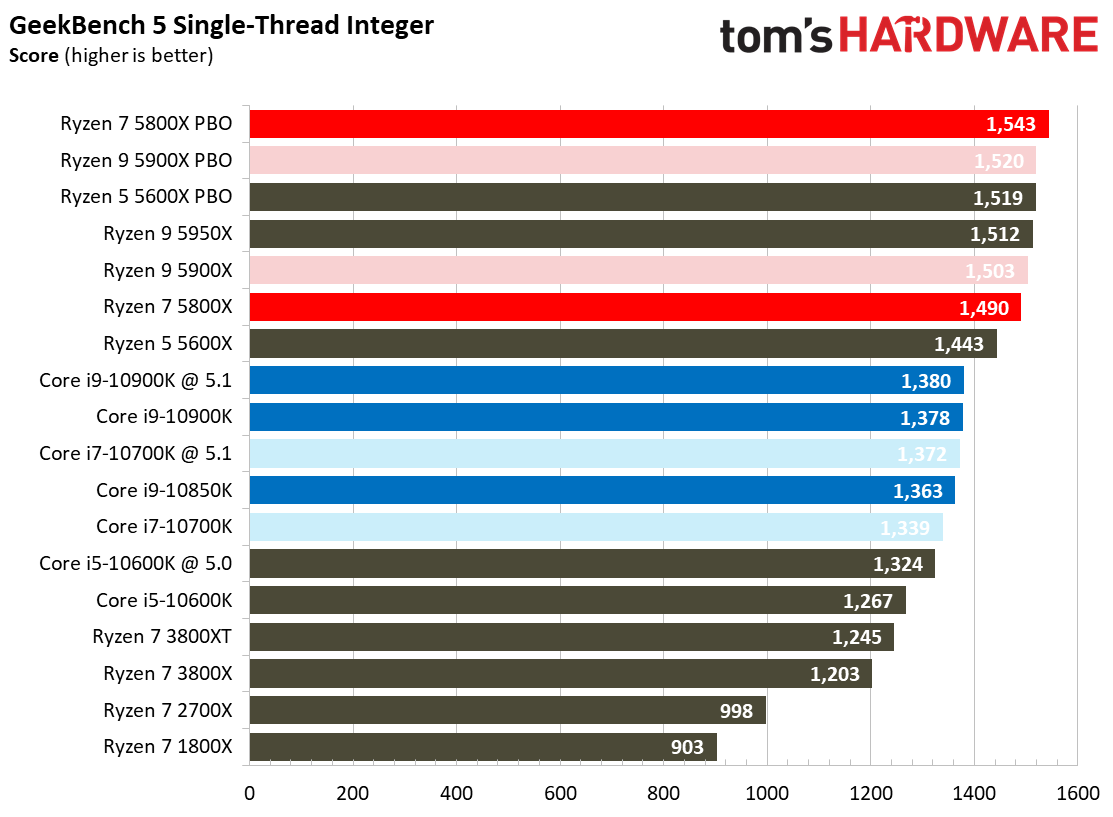
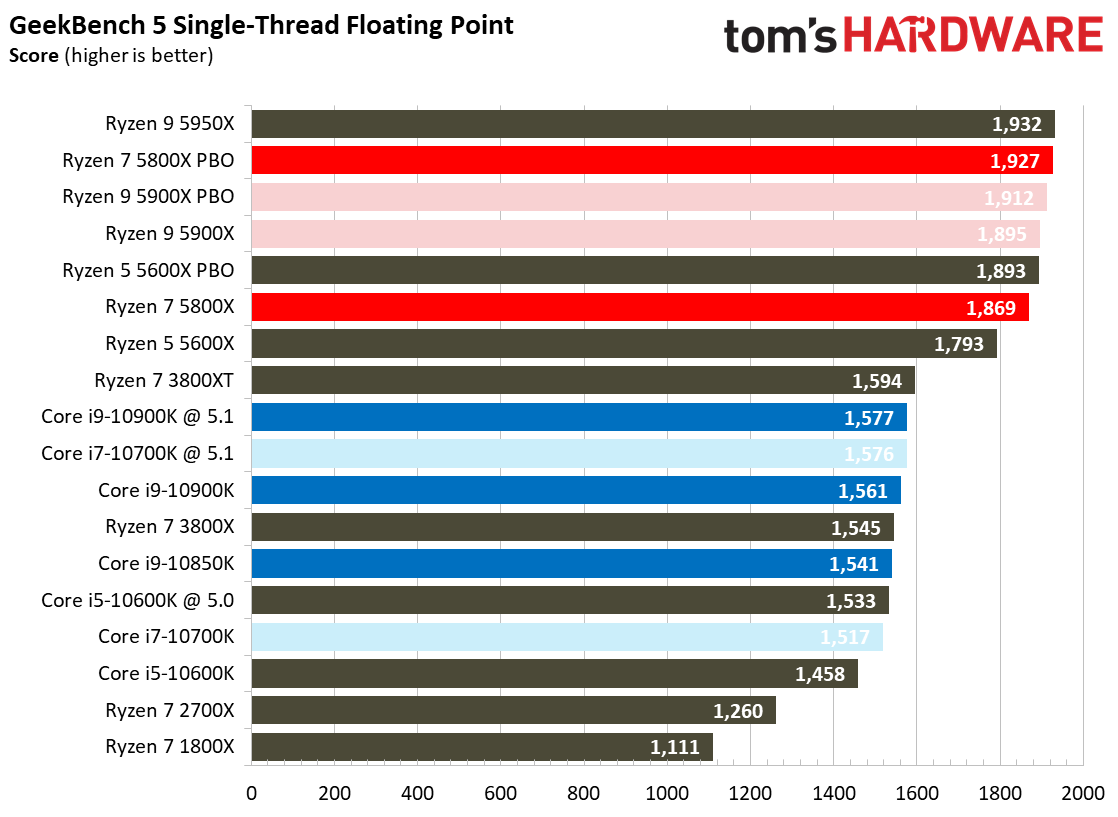
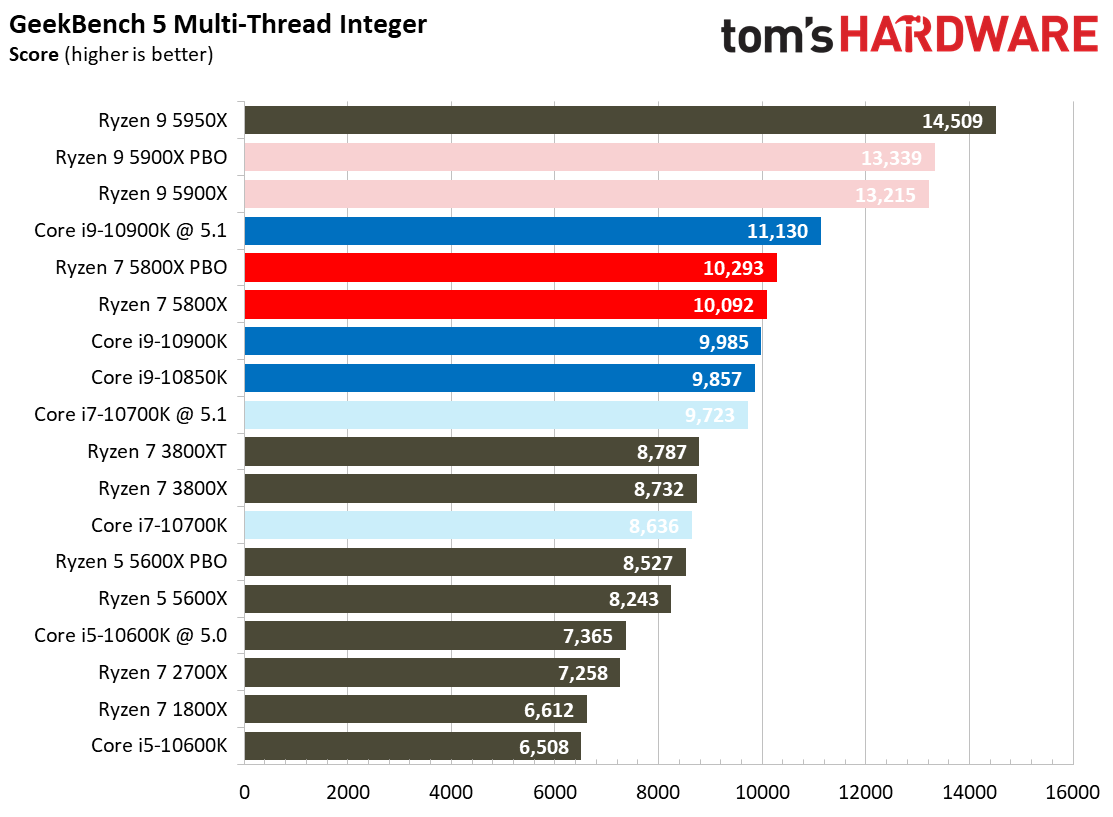
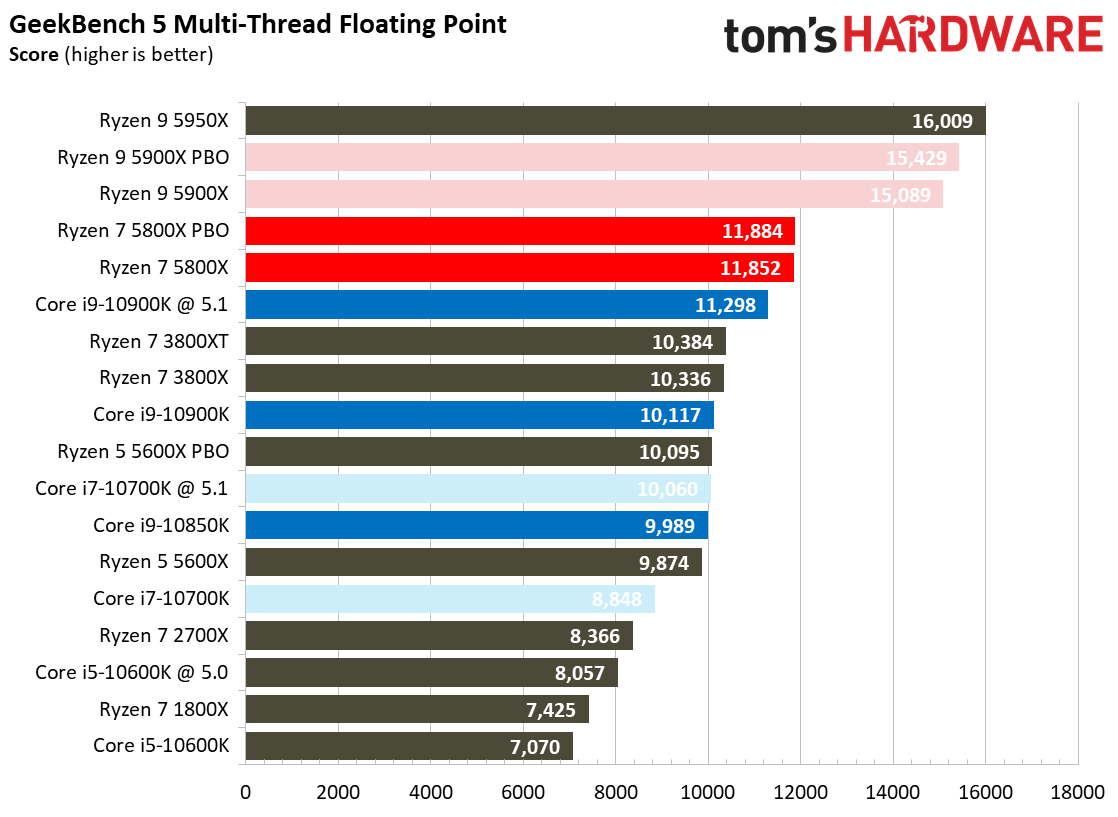
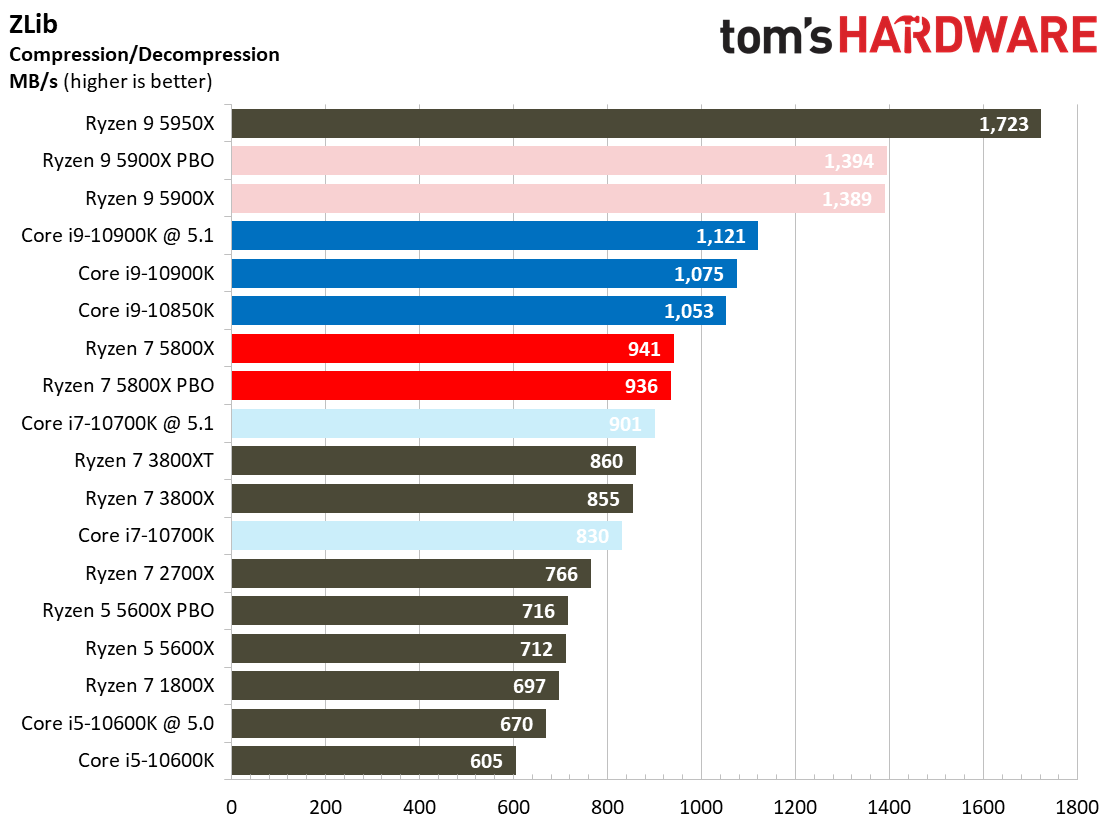
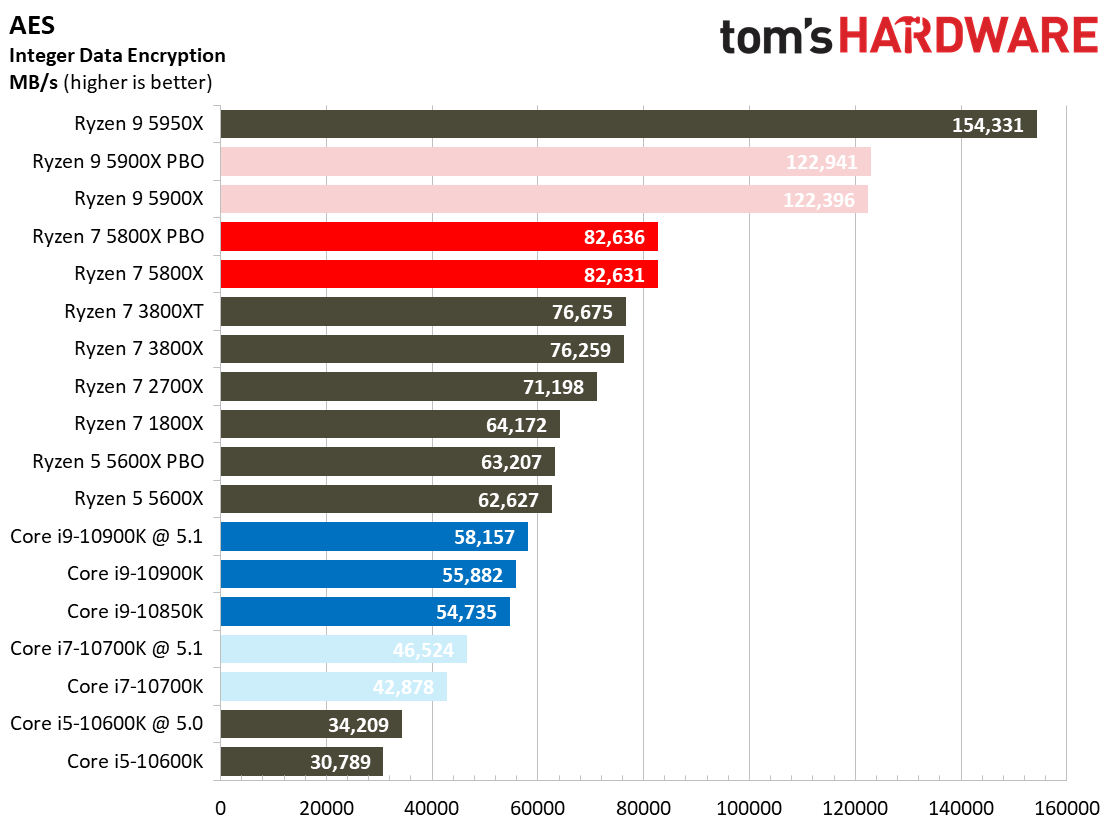
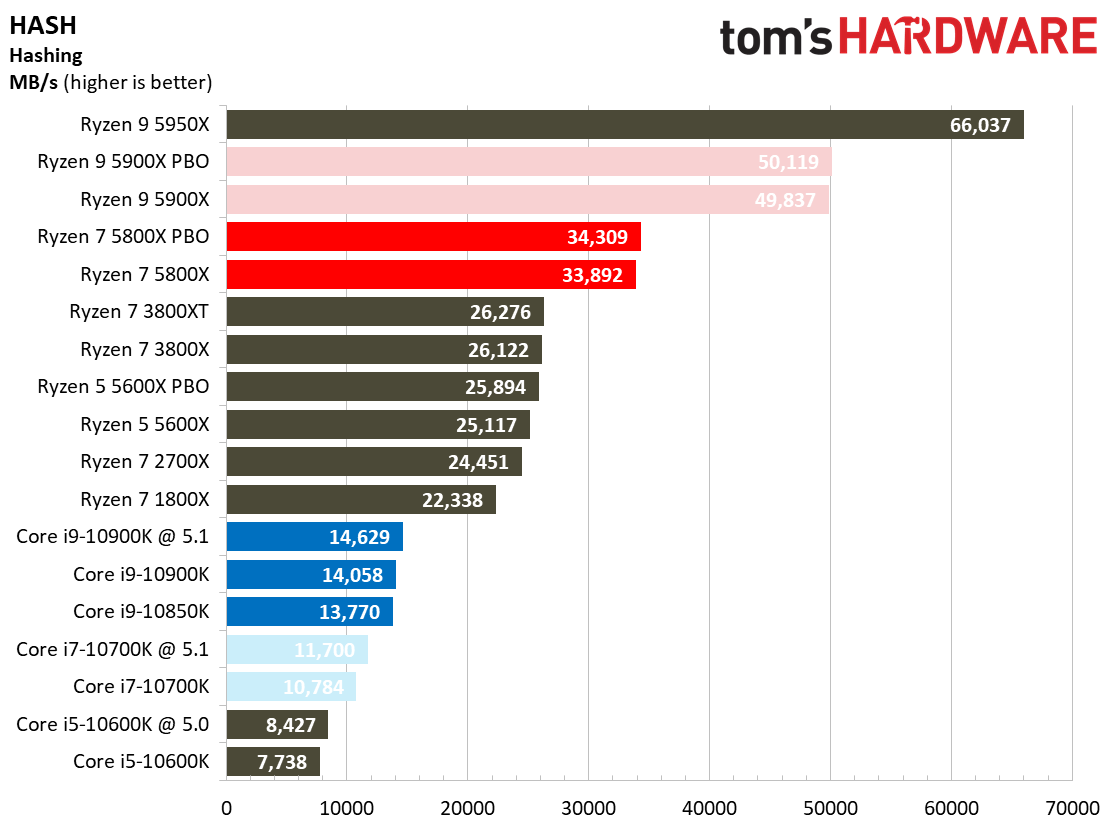
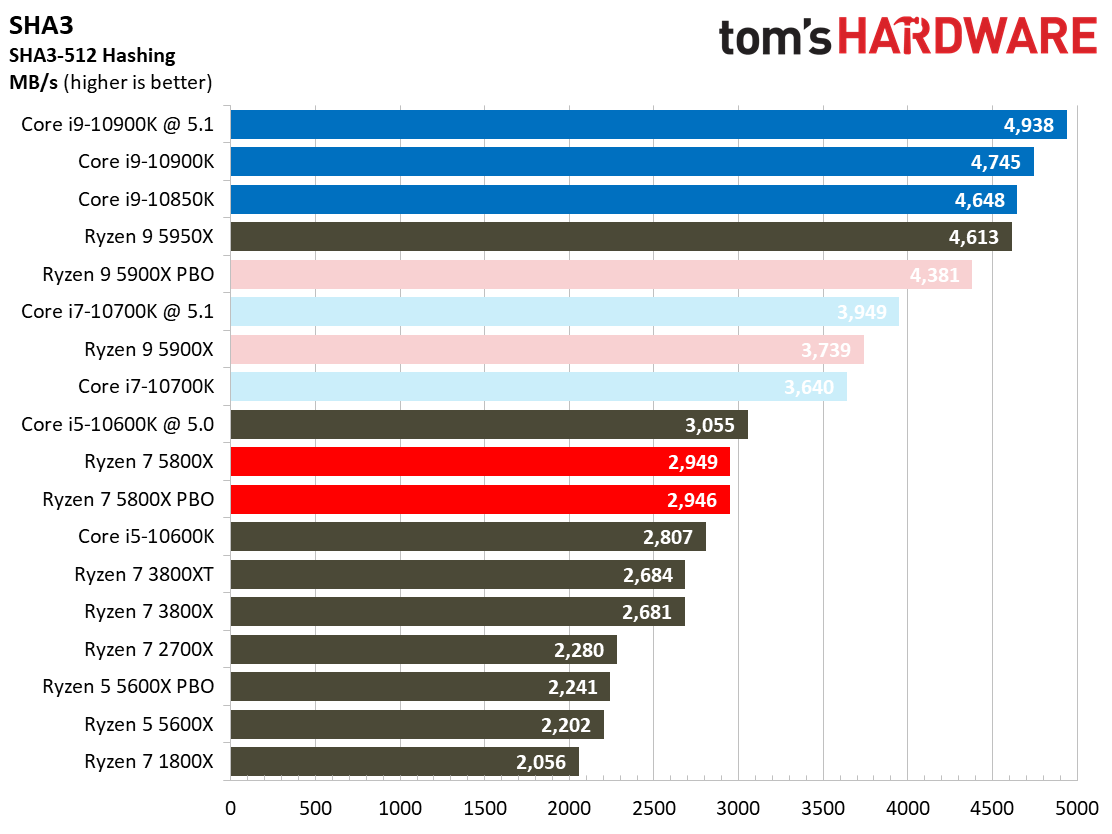
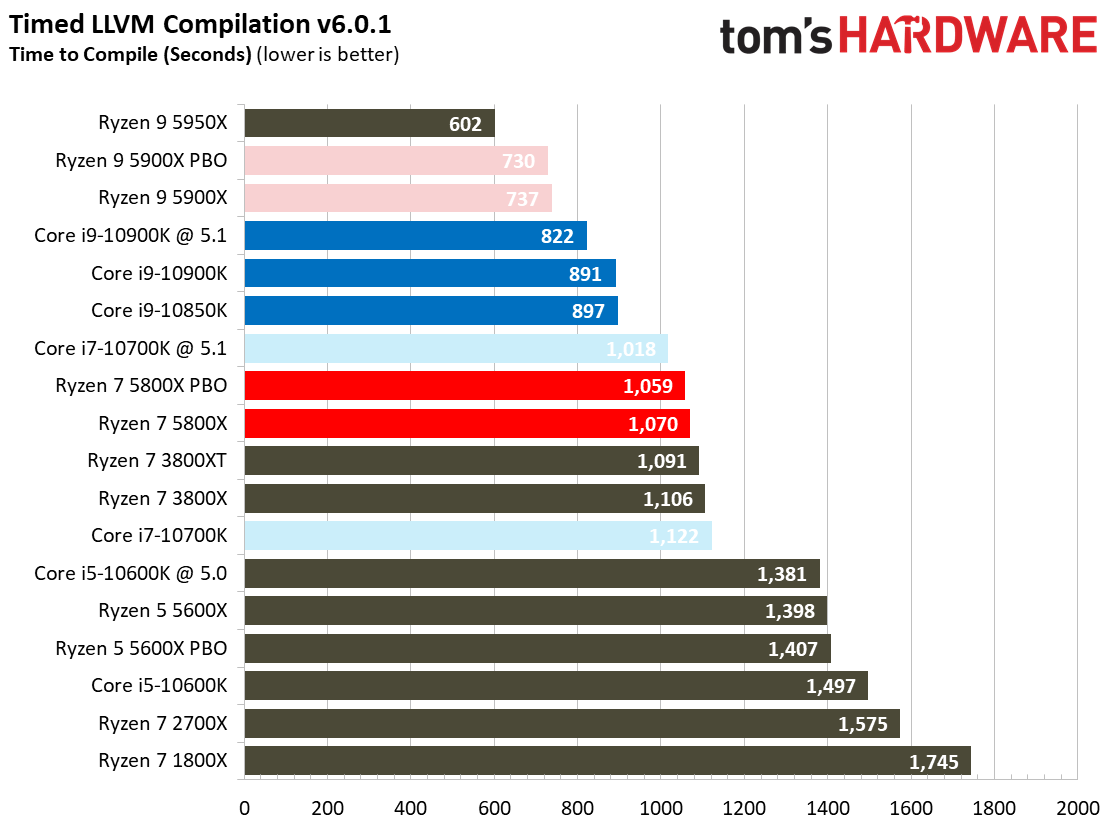
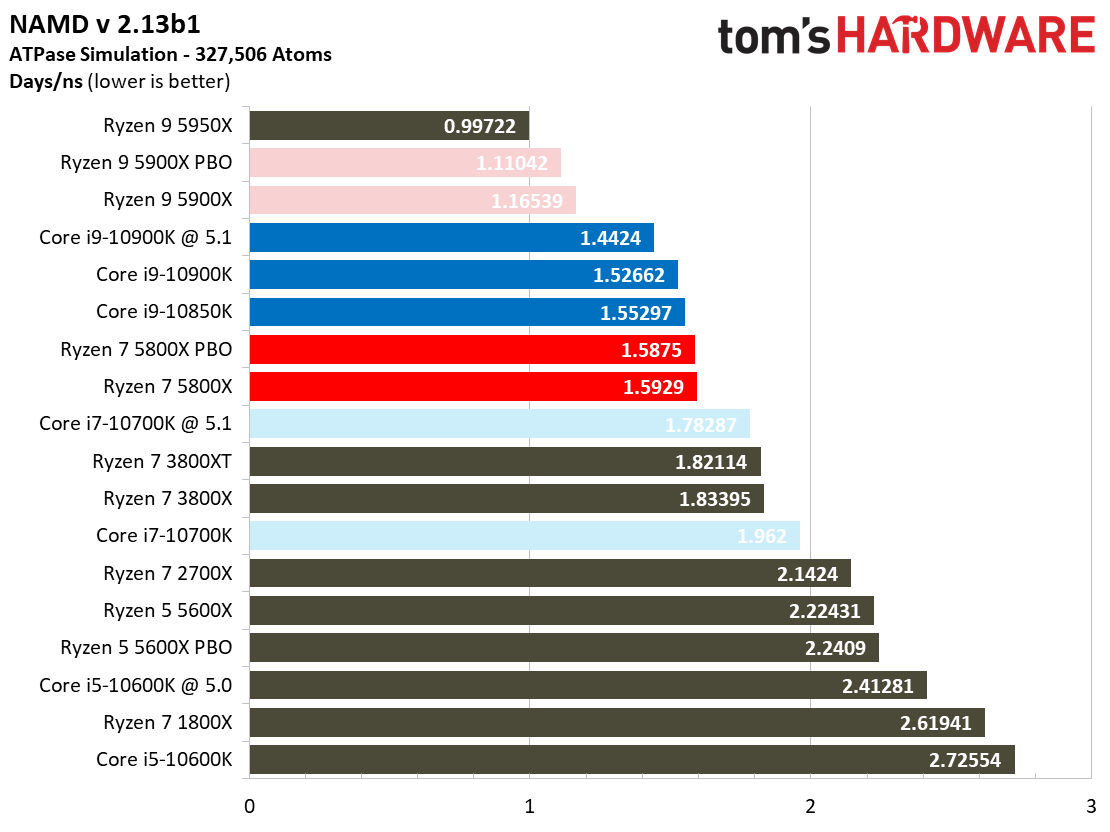
The LLVM compilation benchmark stresses the cores heavily with branchy code. Here we see that, like with the other Ryzen 5000 chips, the Ryzen 7 5800X doesn't offer much performance uplift over the previous-gen Ryzen 7 3800XT. These muted gains imply that the bottleneck lies elsewhere, and we imagine that future software optimizations could bring about larger performance gains.
After overclocking, the Ryzen 7 5800X takes the overall lead in the AVX-heavy single-threaded y-cruncher benchmark and easily beats the Intel processors across the board. The Ryzen 9 models beat the 5800X in the threaded version of y-cruncher, but that isn't surprising due to their higher core counts. The Ryzen 7 5800X more than holds its own against the Intel comparables, though, easily besting them even after overclocking.
The Intel i9 chips scrape past the Ryzen 7 5800X in the NAMD simulation, with overclocking conferring a substantial lead. You'll also notice that the Ryzen chips outstrip the Intel series by massive margins in the hashing and AES encryption benchmarks. This comes as a byproduct of AMD's hardware-accelerated encryption support, an optimization that didn't make its way into Intel's Skylake microarchitecture.
MORE: Best CPUs
MORE: Intel and AMD CPU Benchmark Hierarchy Comparisons
MORE: All CPUs Content
Current page: Ryzen 5 5600X Application Benchmarks
Prev Page Ryzen 7 5800X Gaming Performance Next Page AMD Ryzen 7 5800X, The Price is Not Right
Paul Alcorn is the Editor-in-Chief for Tom's Hardware US. He also writes news and reviews on CPUs, storage, and enterprise hardware.
-
Co BIY "AMD's suggested selling prices rarely manifest at retail, and continuing shortages have found Ryzen 5000 chips selling far over recommended pricing. History indicates that, given sufficient supply, AMD's processors typically retail for far less than the official price points. That makes it hard to predict how pricing will shake out over the next months as supply normalizes. "Reply
Given current market conditions I would expect both AMD and Intel to be able to sell almost everything they make at the prices they want (plus some "obscene" profits for the retailers)
Intel has been able to sell everything they make for the last few years and made tons of money despite their 10nm problems and lack of enthusiast excitement for their incremental gains.
AMD is at parity or has a small lead in performance and can demand the same prices. They probably cannot easily increase production.
AMD's history of below MSRP prices is when they were second tier products in low demand. No reason to think that will be the case going forward on either the supply or the demand side. I don't think I would try waiting for an AMD 5800XT to drop below MSRP.
OTOH - Both AMD and Intel's mid-range chips should be the real competition for their high end products. Games are GPU bound and the mid-range offerings are more than adequate for even a high-end GPU if you can find one. This article clearly points to that sweet spot. -
Phobos258 The tests that put the 5800x PBO at the top of the list show why AMD feels like they can charge what they want for this chip.Reply
Price may suck but it's more available then the rest of the fleet right now. -
purple_dragon The only problem here is the fact you can't acquire a 5000 series chip easily. Whereas, Intel chips are readily available and the I7-10700k is the most reasonable cpu at the moment unless your lucky enough to stumble upon an in stock AMD cpu. Hopefully production catches up with demand soon but it probably won't until March or April 2021.Reply -
clsmithj I'm not in a market for a CPU, my ZEN+ & ZEN2 family CPUs are enough. But if one can get AMD and NVIDIA to kick-start production again of their graphics cards. That would be great.Reply -
Friesiansam "AGAINSTPriceReply
No bundled cooler
No integrated graphics" I don't think most buyers, at this level, are going to be bothered about points 2 and 3. I certainly wouldn't be. -
Remedailjoe Everyone who's commenting negatively obviously doesnt own this chip. My single scores are insane. Hands down destroys anything in intels line up. PBO uses voltage I dont like but it maybe my mobo. Gigabyte x570 Aorus Master.. Hits 1.5volts so i disabled it and set all core 4.85ghz at 1.375volt... Shattered-Dreams #8 CpuZ validation at 5.05ghz. On cell so no link. Over 690 single core.Reply
As for ram I can easily oc my ram 3600 gskill ripjaw 4x8gb to 4200 at 1.45v cl19. Ram oc is all in the motherboard.. And using realistic timings.. -
zodiacfml The 5800x is Amd's perfect silicon, only next to the 16 core. The price is justified being way ahead of its time unlike the 5600x which is perfext for current and existing gamesReply -
mikie tim t With AMD constrained from TSMC, they need to get as much money as they can with the wafers they get. They will have no shortage of I/O dies as they are 12nm from Global Foundries, so it makes absolute business sense to get as much money right now as they can with the inputs they have available, which means that 5800X is going to be what they push out the doors until they have enough lower quality chiplets to boost production of 5600X and 5900X, respectively. I was able to get a 5800X from the Overland Park, KS MicroCenter at MSRP, and it has been a night and day difference in responsiveness on everything over the 3600X it replaced, which wasn't particularly slothful. I don't feel shortchanged at all, quite frankly. I hope AMD can pull as much market share as possible from Intel these next few quarters, because that's what it will take to move both companies to better execution, to the benefit of us all.Reply -
mrv_co I get the argument on paper that the 5800x is overpriced, but that argument has been strictly an intellectual one to date. I also don't doubt that once supply finally outpaces demand, the street price will adjust accordingly. Regardless, bring on the 5700x for my SFF upgrade!Reply